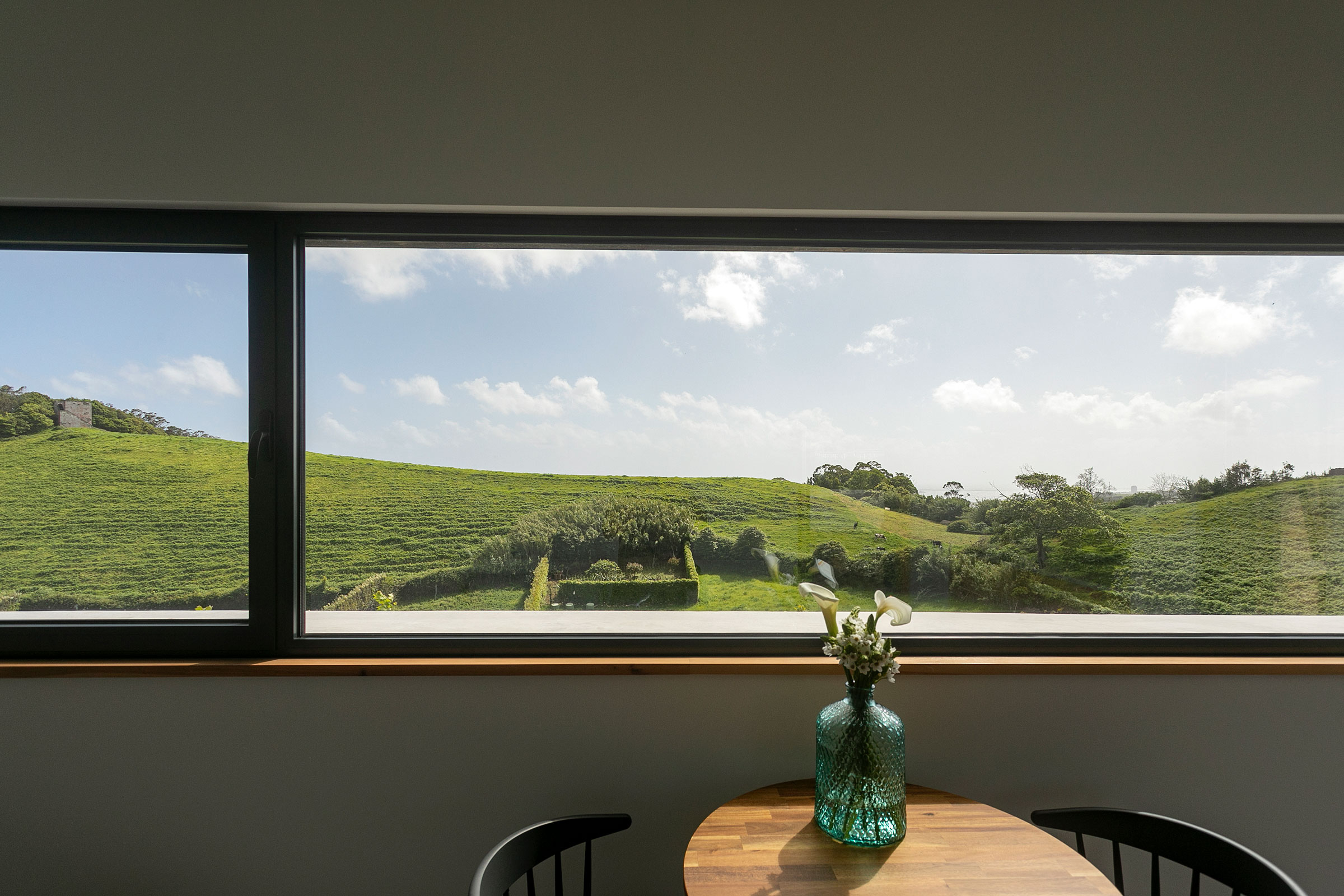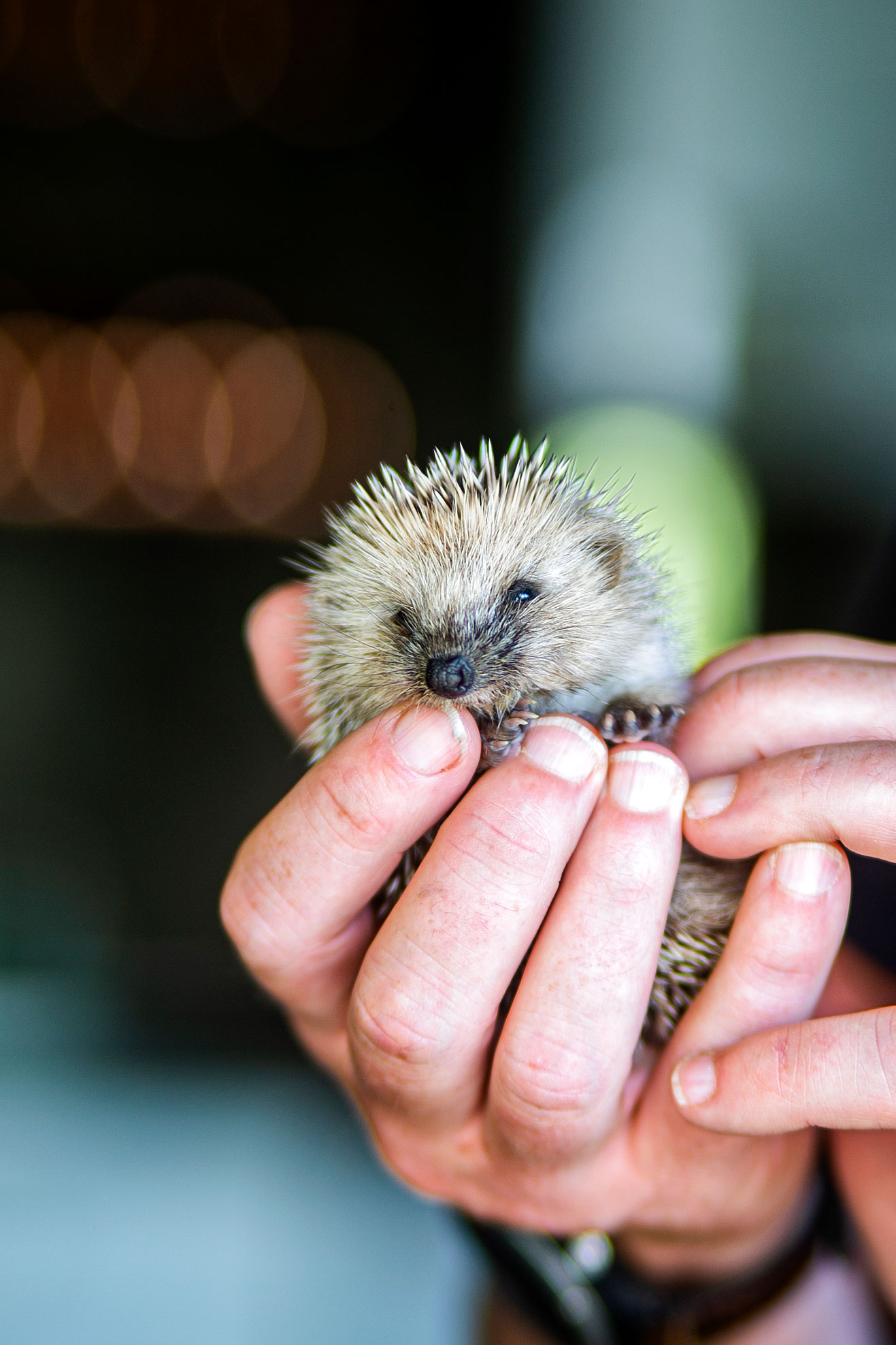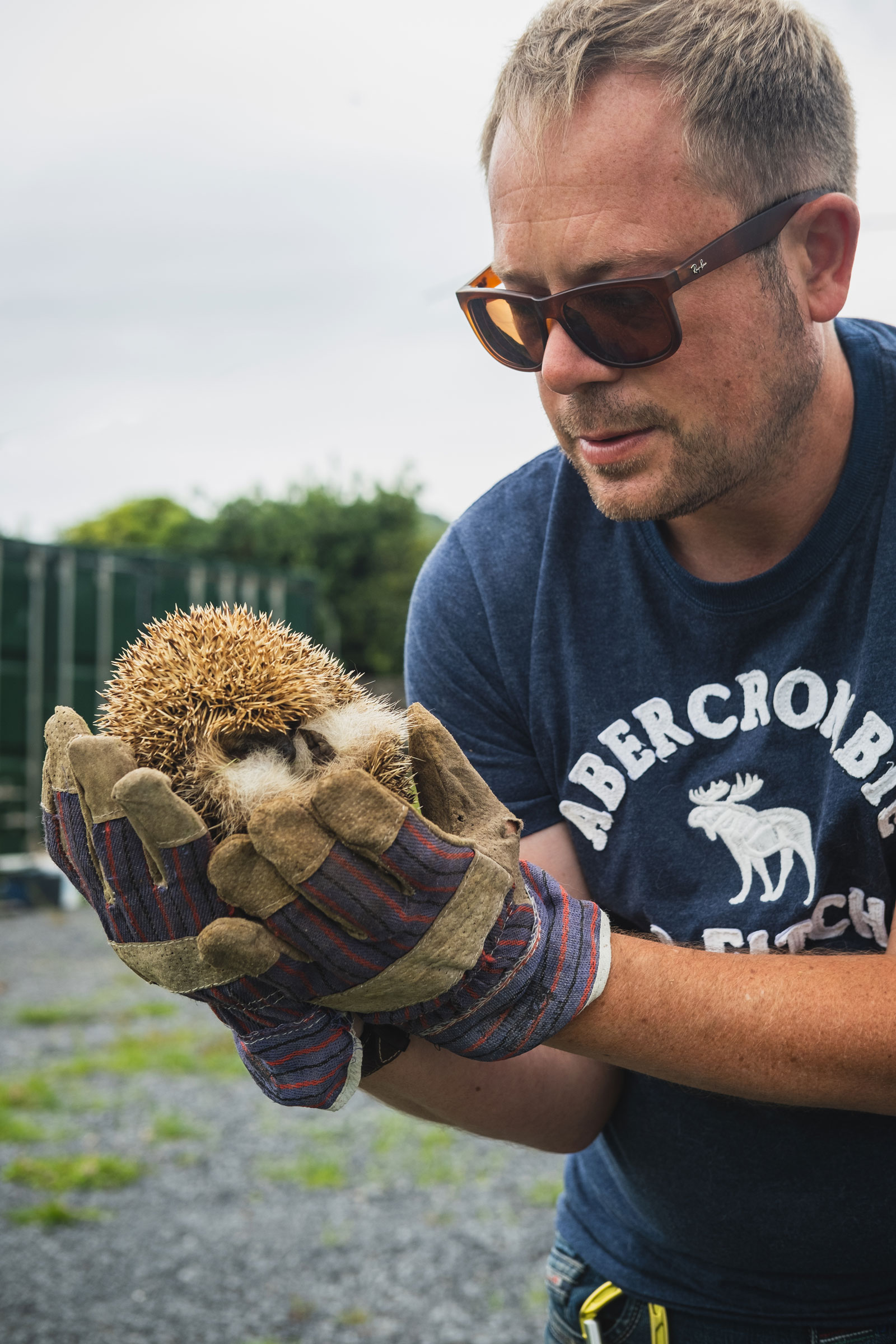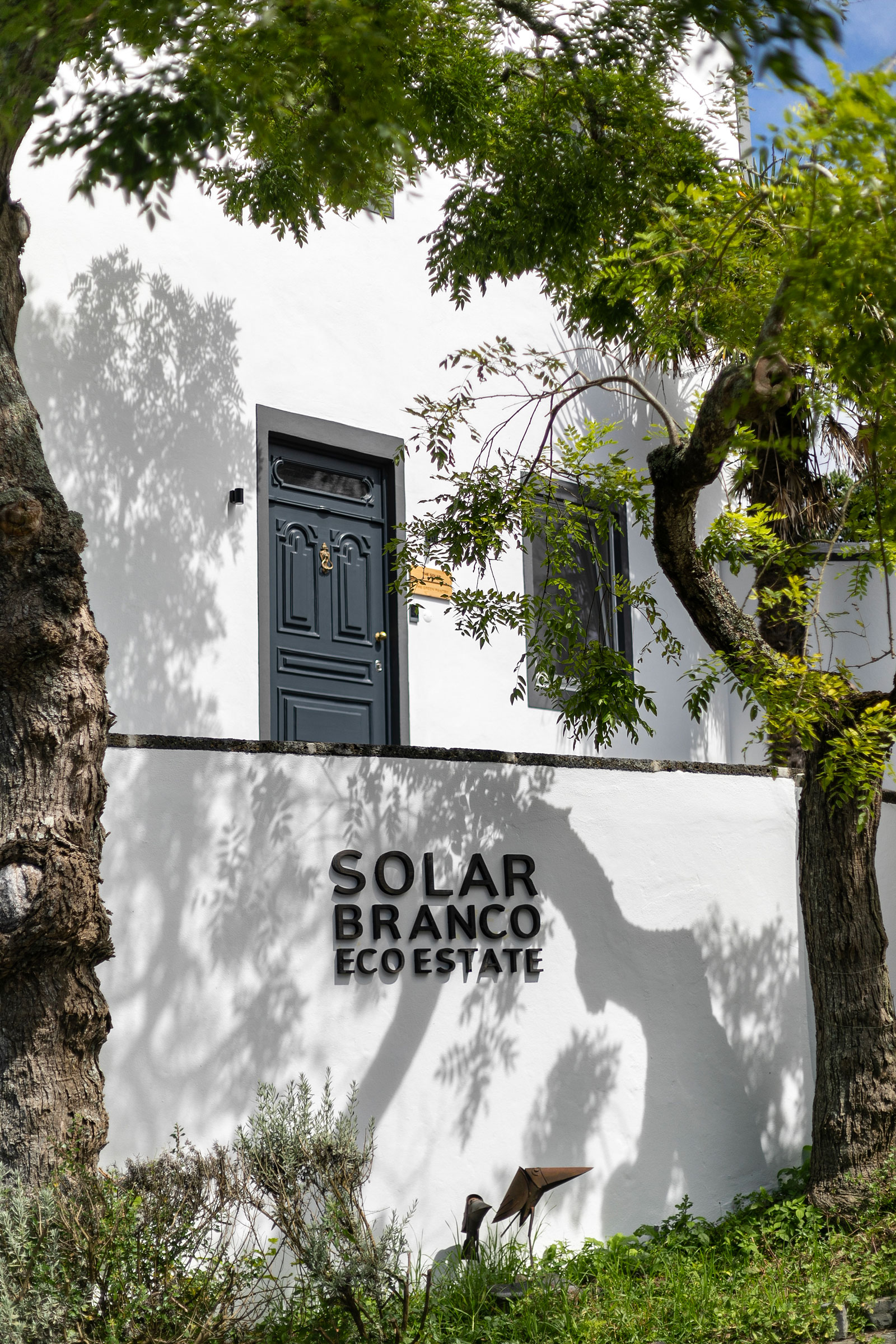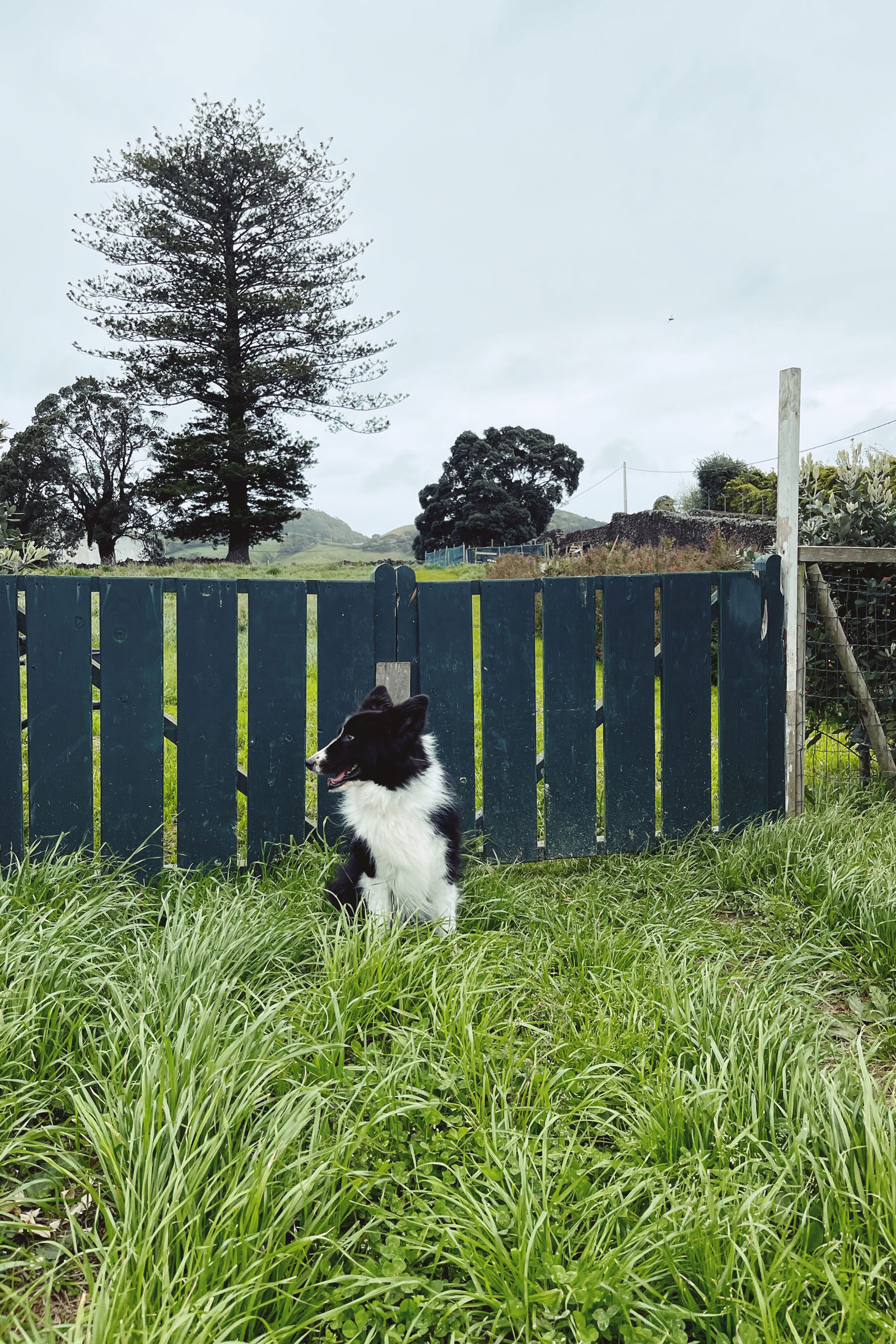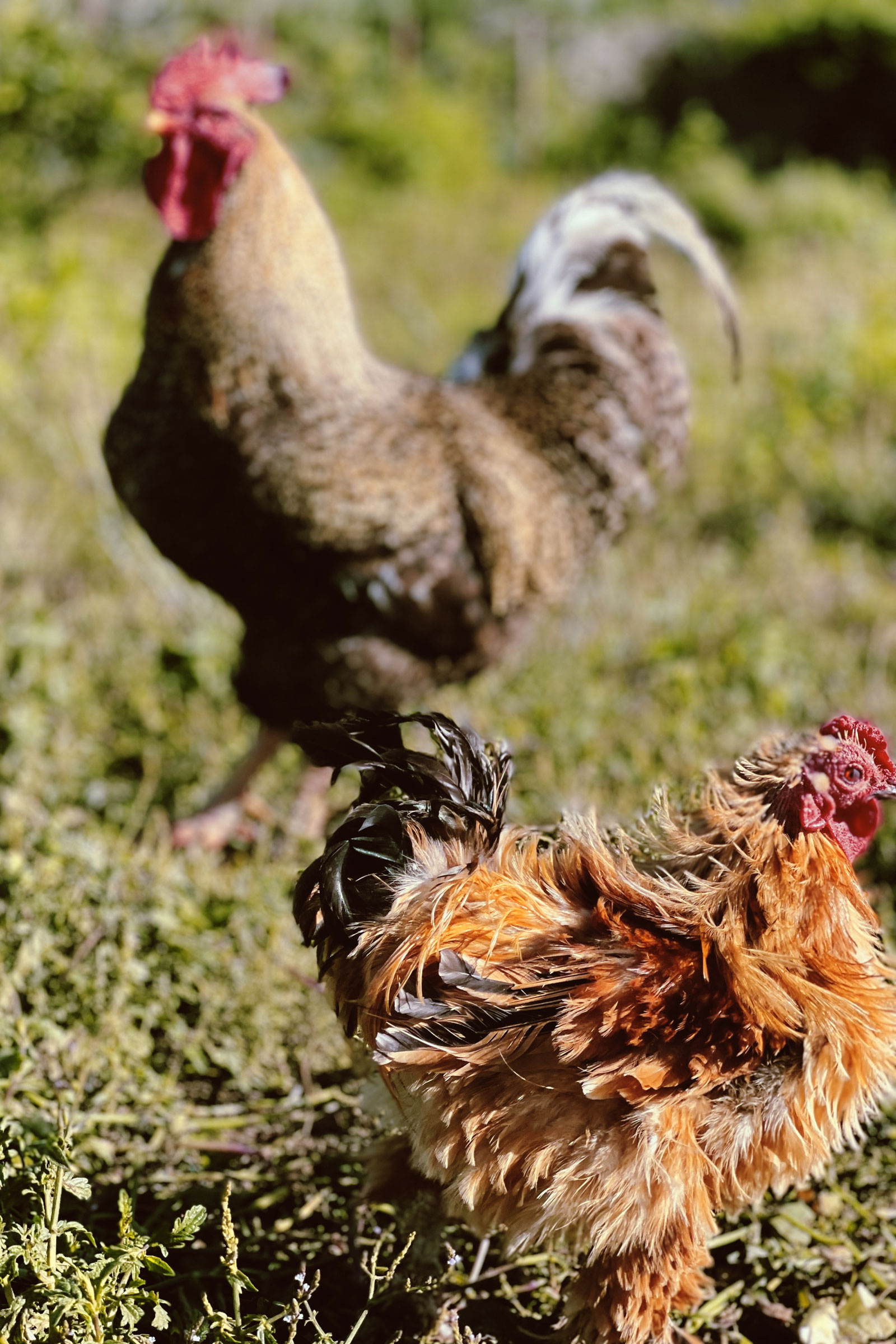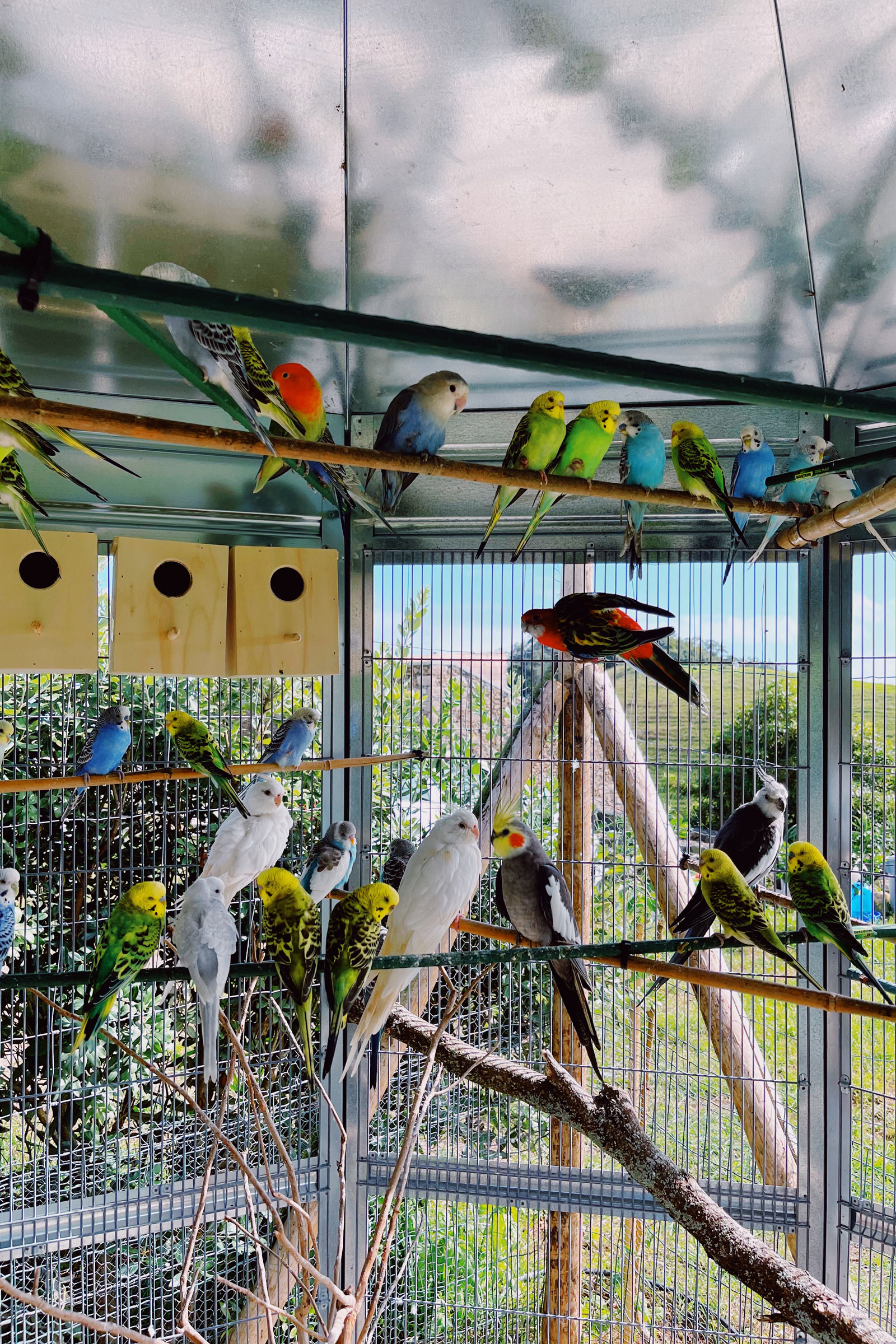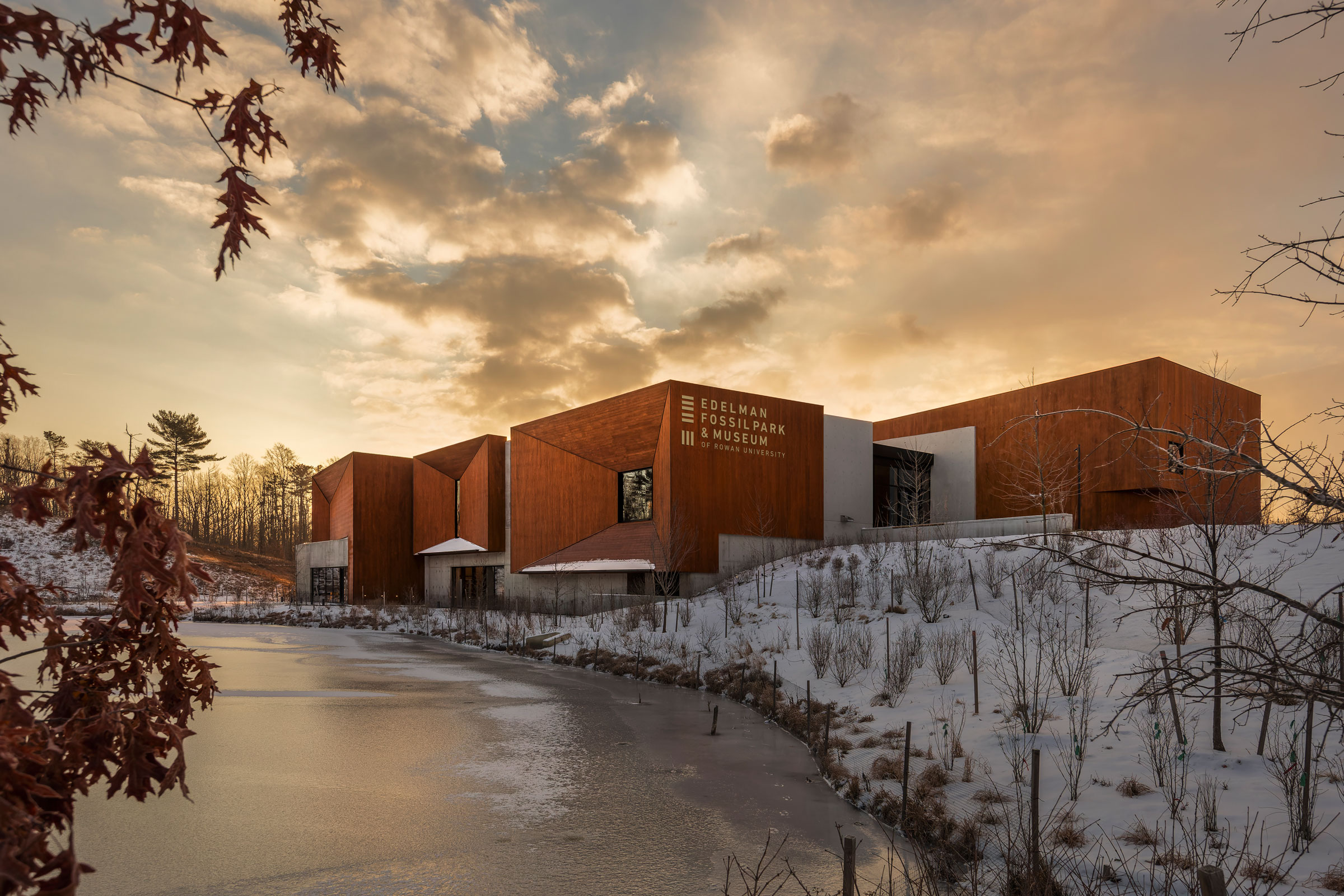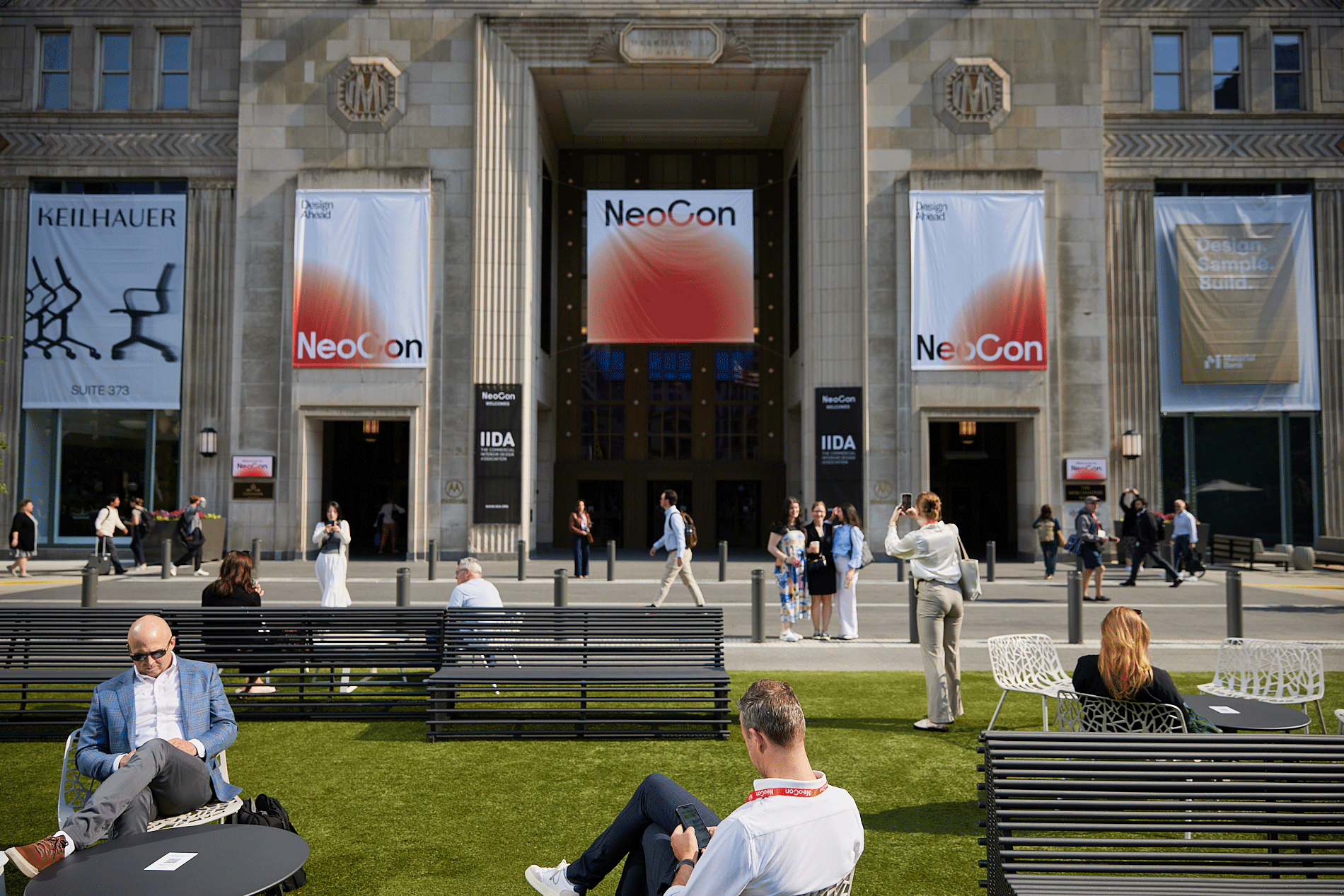Story at a glance:
- A couple from London is committed to renovating a long neglected property in the Azores.
- Solar Branco Eco Estate on São Miguel Island in Portugal has eight eco-friendly suites and cottages.
- The hotel produces zero food waste, runs largely on solar, and educates guests about how they can make a difference environmentally.
Minutes from town on a large plot of farmland on the island of São Miguel sits Solar Branco Eco Estate—once an elegant summer home with a barn and pig sty that fell into neglect with leaking, untenable buildings and crumbling, overgrown rock walls. Today Solar Branco is an evolving adaptive reuse project of great proportion. It’s beautiful and luxurious yet environmentally aware, producing zero food waste and offering clean, simple, high-quality accommodation.
Caroline Sprod and her husband Ali Bullock first visited this area in the Azores in 2006 on their honeymoon. “We always had it in the back of our minds that one day we would love to go and live there,” Sprod says.
They didn’t have a hospitality or farming background, but they had a passion for sustainable design and gardening. Bullock previously worked in marketing, and Sprod has done all kinds of different work, including (and currently) as a forest therapy guide. They’re smart, ambitious, and entrepreneurial. Their journey ultimately took them from their home in London to Hong Kong for Bullock’s career and, finally, to the Azores. “When we lived in Hong Kong I had a rooftop garden, but everything was in pots,” Bullock says. “I figured if you can keep things alive in Hong Kong, you can garden anywhere.”
Sprod says they dreamed of one day starting a sustainable guesthouse. “We went on an exploratory trip to the Azores looking for a rundown property in the countryside that had interesting outbuildings—something quirky we could bring back to life. Straightaway we found this place.”
The land needed serious love but had clear potential. “We could see it could be something really beautiful, so we bought it and embarked on our journey,” Sprod says.
Restoring a Historic Property
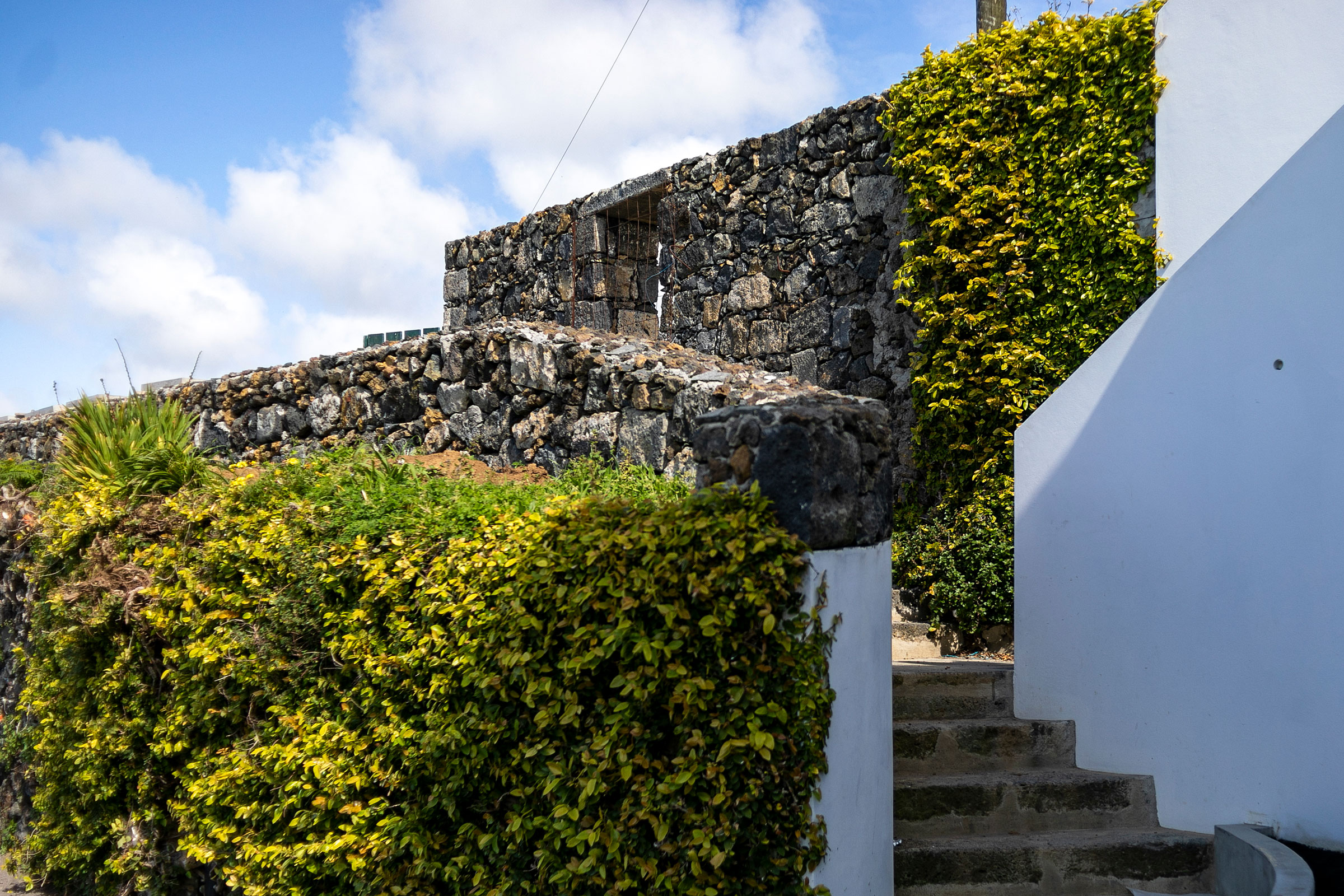
Today the property that is the Solar Branco Eco Estate is home to impressive grounds, from the flowers and fruit-bearing trees to the boutique hotel accommodations, restored ruins, and even a bit of an accidental animal refuge. Photo by Rui Soares
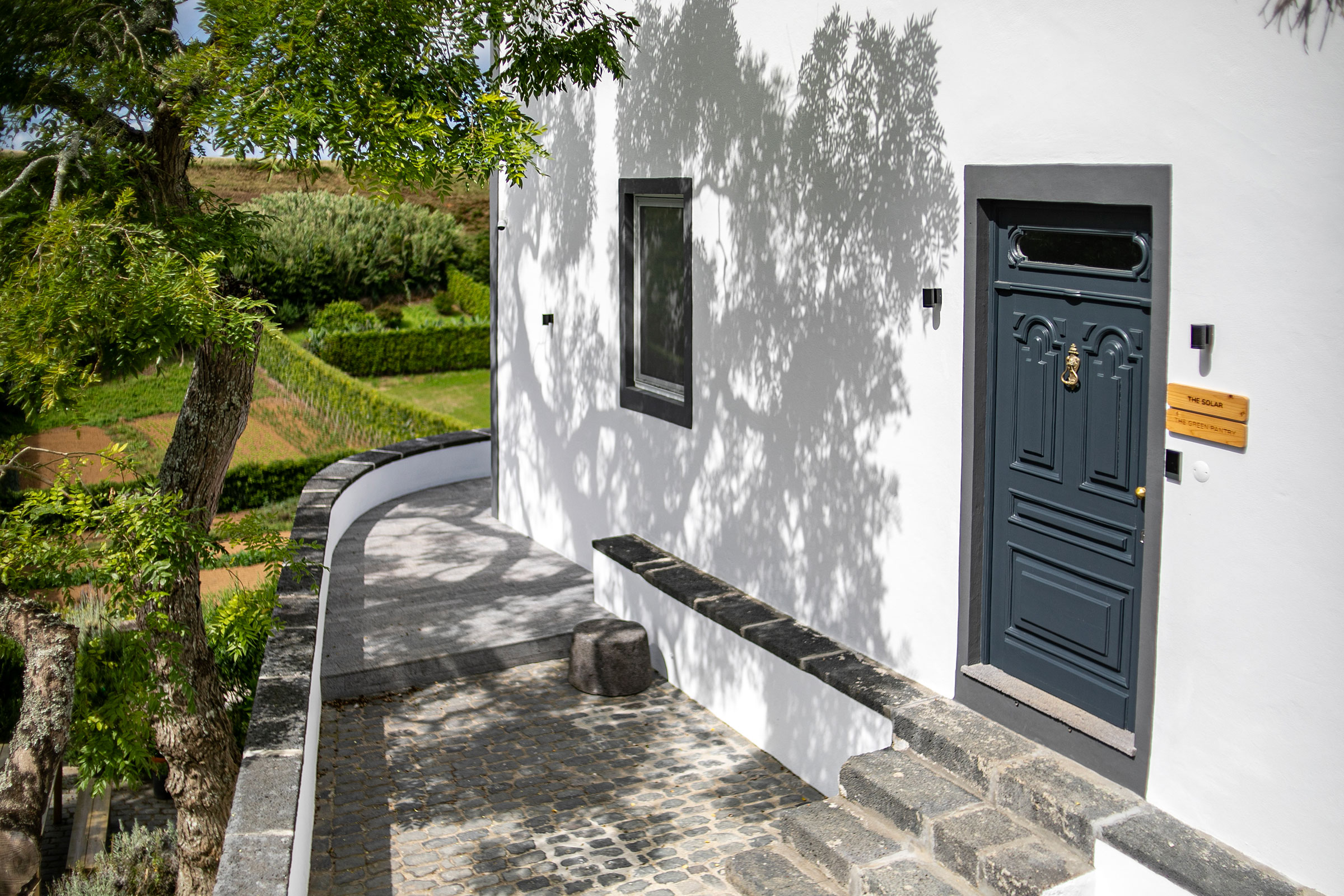
Photo by Rui Soares
The 19th century property dates back to a time when many on the island were growing and exporting oranges to places like London. It was a brief period of riches for those farmers, many of whom then lost their fortunes when disease came in and wiped out their crop.
Before its most recent transformation, Solar Branco was a summer house; this was in the days before flights out of São Miguel were plentiful. Bullock says the previous owner lived in nearby Ponta Delgada and used the place as his vacation home. It had been for sale for several years, but no one seemed to want to take on the renovations needed. But Sprod and Bullock love saving things and saw its charm right away. Plus, they had a vision that was sure to succeed—and a dream to build something unlike any other accommodation on the island.
Education and Animals
- Co-owner Ali Bullock has a soft spot for animals, including hedgehogs. Photo by Rui Soares
- This hedgehog was found stuck in a hedge, but Ali managed to get it out safely. “You aren’t meant to domesticate them,” he says. “They’re wild and protected in the Azores. Sometimes people find them by the side of the road and bring them to us.” Photo by Rui Soares
Today old buildings, fallen timber, repurposed doors, salvaged plants, and even some unexpected animals find new life at the Solar Branco Eco Estate. Phrases like “rescue hedgehogs” and “the parakeets we saved” are as commonly heard from Bullock as the more expected “free-range chickens” or “frog ponds.” The hedgehogs, at least for one group of American tourists, were among the property’s biggest surprises. Bullock says they burrow among salvaged wood in a dark corner of the property on any given day, safe from curious and sometimes dangerous dogs. “We don’t feed them, but they have a place to stay and there’s enough to eat. If they want to stay they stay, or they can go.”
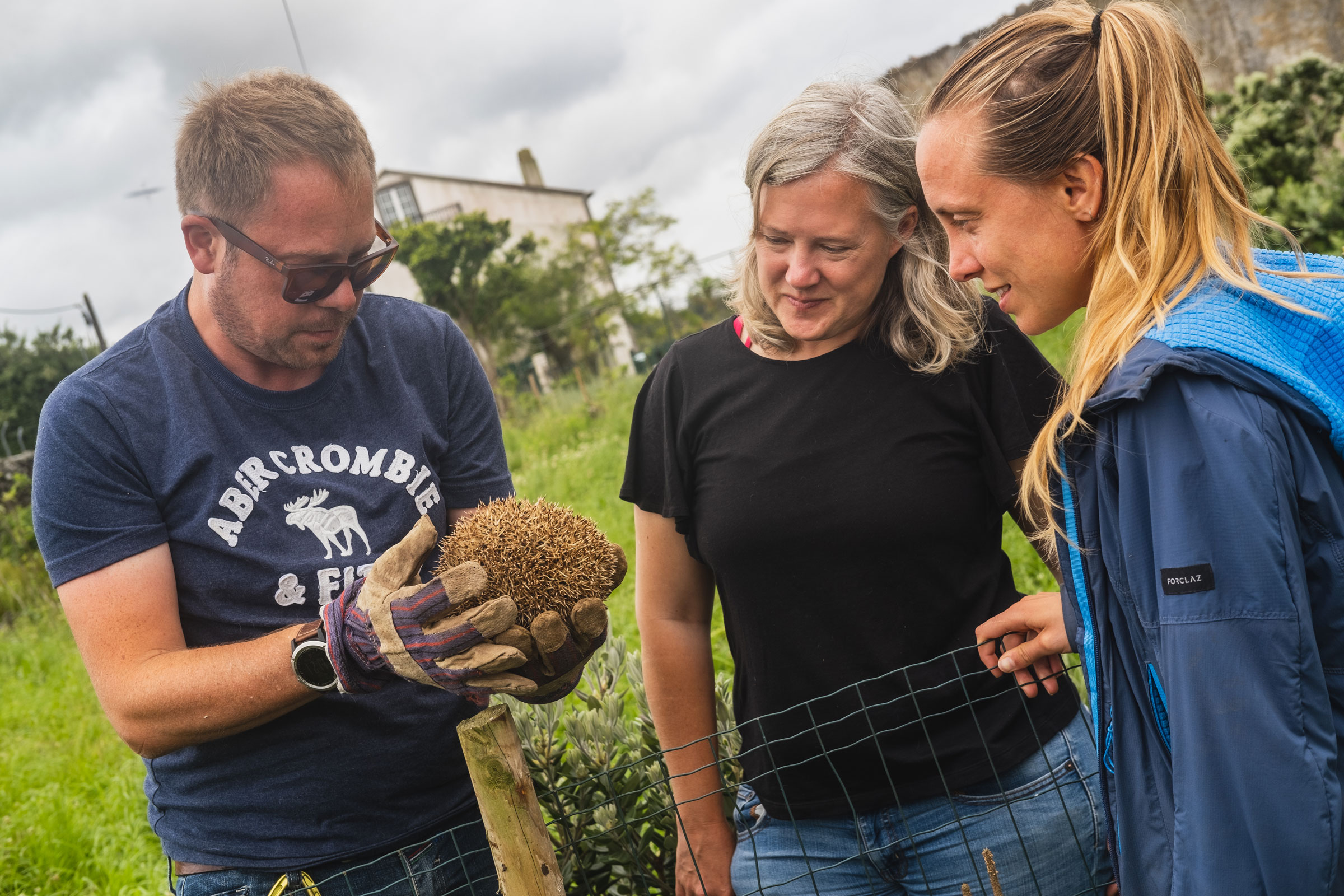
Ali and Caroline carefully remove a hedgehog. Photo by Rui Soares
You’ll also find three dedicated wildlife ponds, local birds, and a large area for the roaming chickens who eat any leftover food that doesn’t go to compost.
Neighboring cows still roamed the grounds when Sprod and Bullock purchased the property in 2018, but the land was incredibly overgrown at that time, and some of the century-old New Zealand Christmas trees had sadly been cut down. “We saved the others; thank goodness,” Bullock says.
- Outside the Solar Branco Eco Estate. Photo by Rui Soares
- The owners’ dog Una moved to the Azores with her owners from Hong Kong. In the background, a New Zealand Christmas tree towers over the grounds. Photo by Rui Soares
A big part of owning Solar Branco is education. “We love showing people around,” Bullock says. He takes pride in the hotel’s truly environmental practices and wants to share that knowledge with guests.
The hotel aims to achieve at least 80% energy use from renewable sources like the solar panels on the property, for example, and they strive to keep all of the grass natural.
“A lot of so-called eco hotels have perfect cricket grass, which of course doesn’t have any flowers for the bees. There are hotels here where you see that it’s all beautifully manicured, but it’s no good for the wildlife. We explain to people that we don’t cut the grass because we want to keep the wildflowers for butterflies and insects. You have to maintain it a bit, but we try to keep it as natural as we can.”
- All eggs at Solar Branco come from cage-free chickens on the grounds. Photo by Rui Soares
- Rescued parakeets and other birds no longer wanted as pets find a safe home at Solar Branco. Photo by Rui Soares
Today you’ll find limes, lemongrass, avocado, mangoes, strawberries, pineapple sage, honeysuckle, and morning glory, among other beautiful and delicious offerings, plus plentiful clover for the bees. He points to budding coffee plants, one of his latest endeavors, and laughs. “We won’t be taking on Starbucks anytime soon,” he says. He pulls a guava from a tree and encourages a guest to take a bite. “You really can grow almost anything here. It’s incredible.”
He and the team also planted hedging to fight the wind, a continued struggle, but one he says will pay off. Currently the hotel employs eight people, including Bullock and one full-time gardener tending to the grounds.
From Dilapidated to Destination
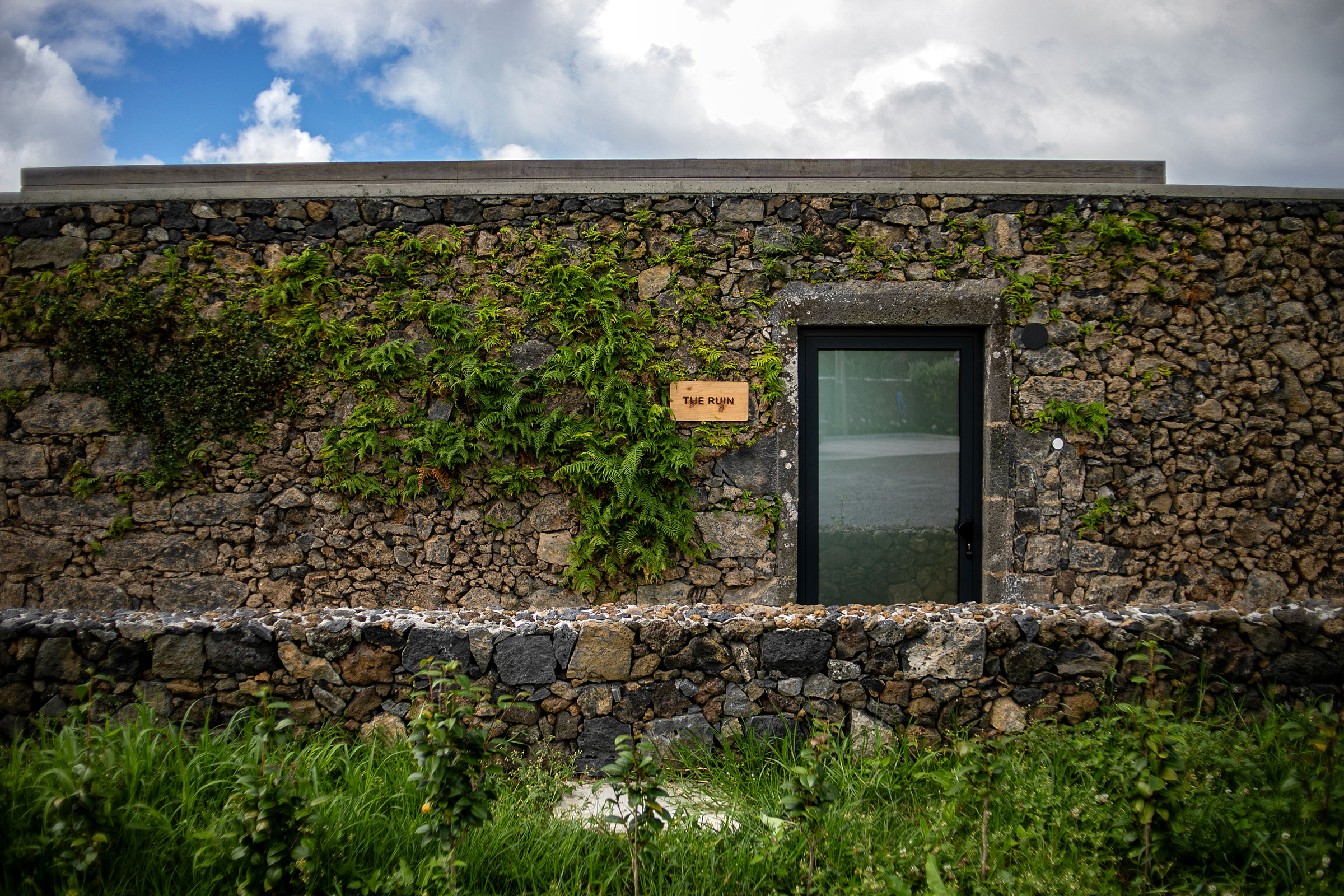
Called The Ruin, this two-story cottage was an abandoned farm building for decades before being brought back to life as part of Solar Branco. “We wanted to take something that was old and crumbling and restore it to something beautiful and comfortable,” says co-owner Caroline Sprod. Photo by Rui Soares
Bullock and Sprod worked with architect Joana Oliveira from Mezzo Atelier to bring their vision for Solar Branco to life. The eco estate officially opened to guests in June 2023. “Portugal is not a place where you can do this DIY,” Sprod says, adding that resources can be difficult to find. “We found an architect we wanted to work with who grew up maybe two miles from here. She combines local features in a modern and minimalist way, which is a style that spoke to me. I felt we had the same understanding of what we wanted the place to look like.”
The property’s main house, or solar, which Sprod says loosely translates as “country house,” was in a livable-ish state when the couple purchased the property five years ago. They lived there while work was ongoing.
“Everything was a bit decrepit,” Sprod says. The electricity was unreliable, water leaked in the bedroom when it rained, but at least one of the toilets worked.
We wanted to take something that was old and crumbling and restore it to something beautiful and comfortable.
Three of the property’s outbuildings—originally one farmer’s cottage and two pigpens—were hidden from view when the property fell into disuse. The area became overgrown and covered in trash. In total the Solar Branco Eco Estate now has eight luxury suites and cottages. The Barn is a two-story cottage built on the site that previously housed an old farmyard storage shed.
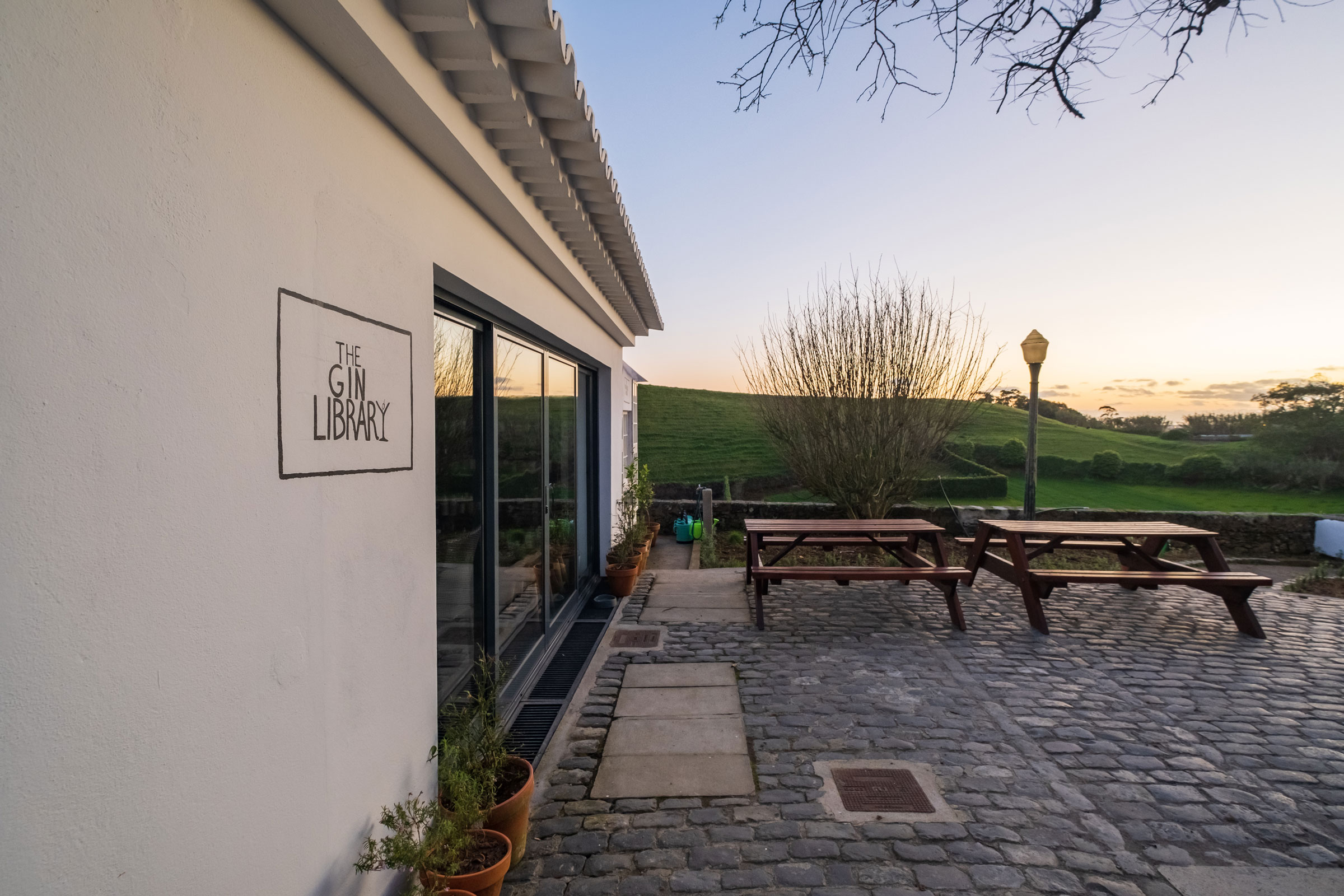
The Gin Library, formerly stables, is now home to more than 1,000 bottles of gin from all over the world. What started with Ali’s own collection has grown to include bottles guests bring to add to the library, too. Photo by Rui Soares
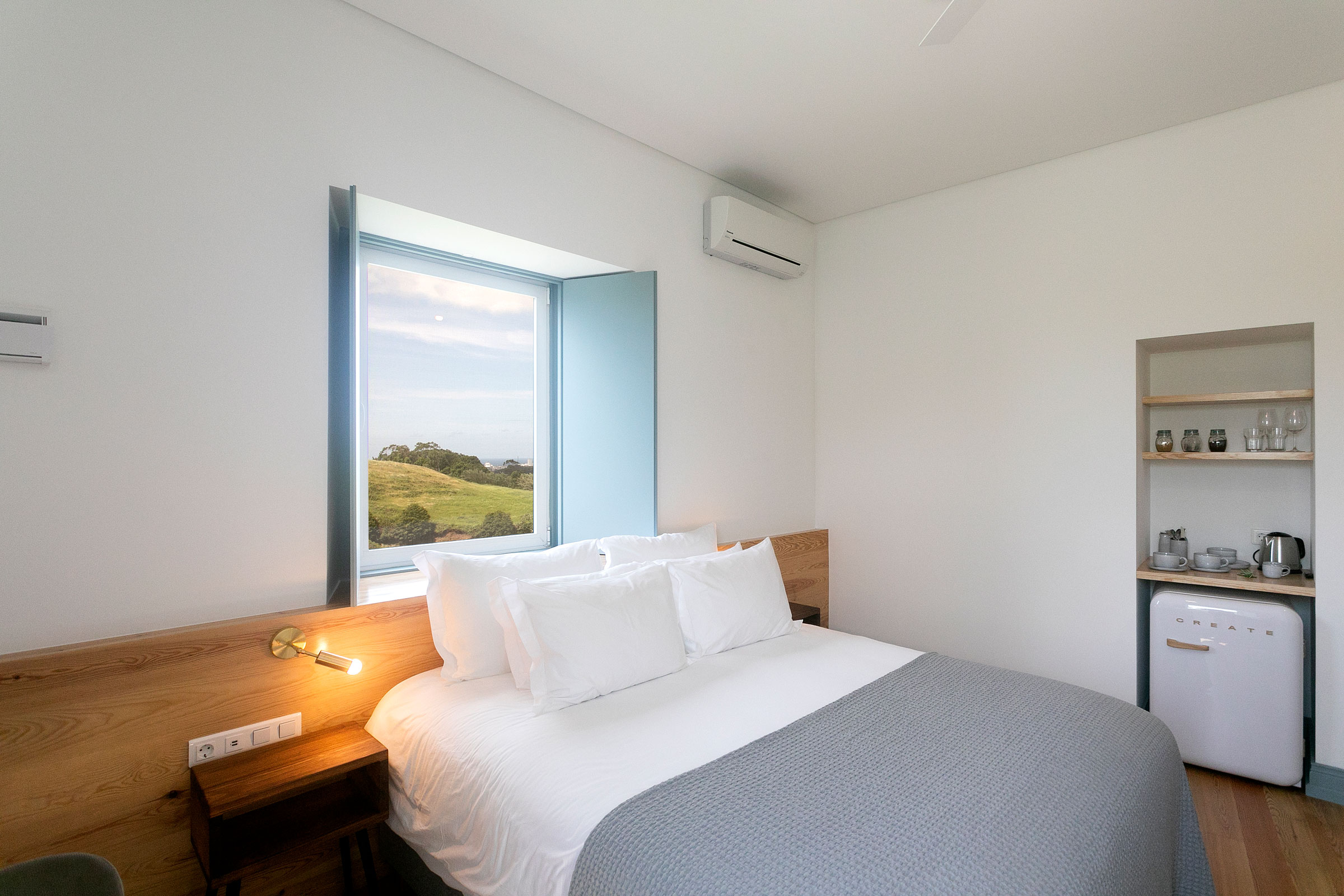
Each room in Solar Branco is thoughtfully appointed. The hotel gives guests real-time visibility of their energy usage to encourage them to use only what they need. Photo by Rui Soares
Sprod says the main house, built more than 100 years ago, is the heart of the project as well as the center of the estate. It has three luxury bedrooms and a separate studio apartment upstairs, as well as a spacious dining area on the ground floor.
Bullock says it took about four years to get the property to its current state, though much of that work continues, including restoring the land on a hill below the main house where stone walls were so overgrown you wouldn’t have known they were there. “Sadly we had to cut back some of the trees down there because they just hadn’t been looked after in 40 years,” he says.
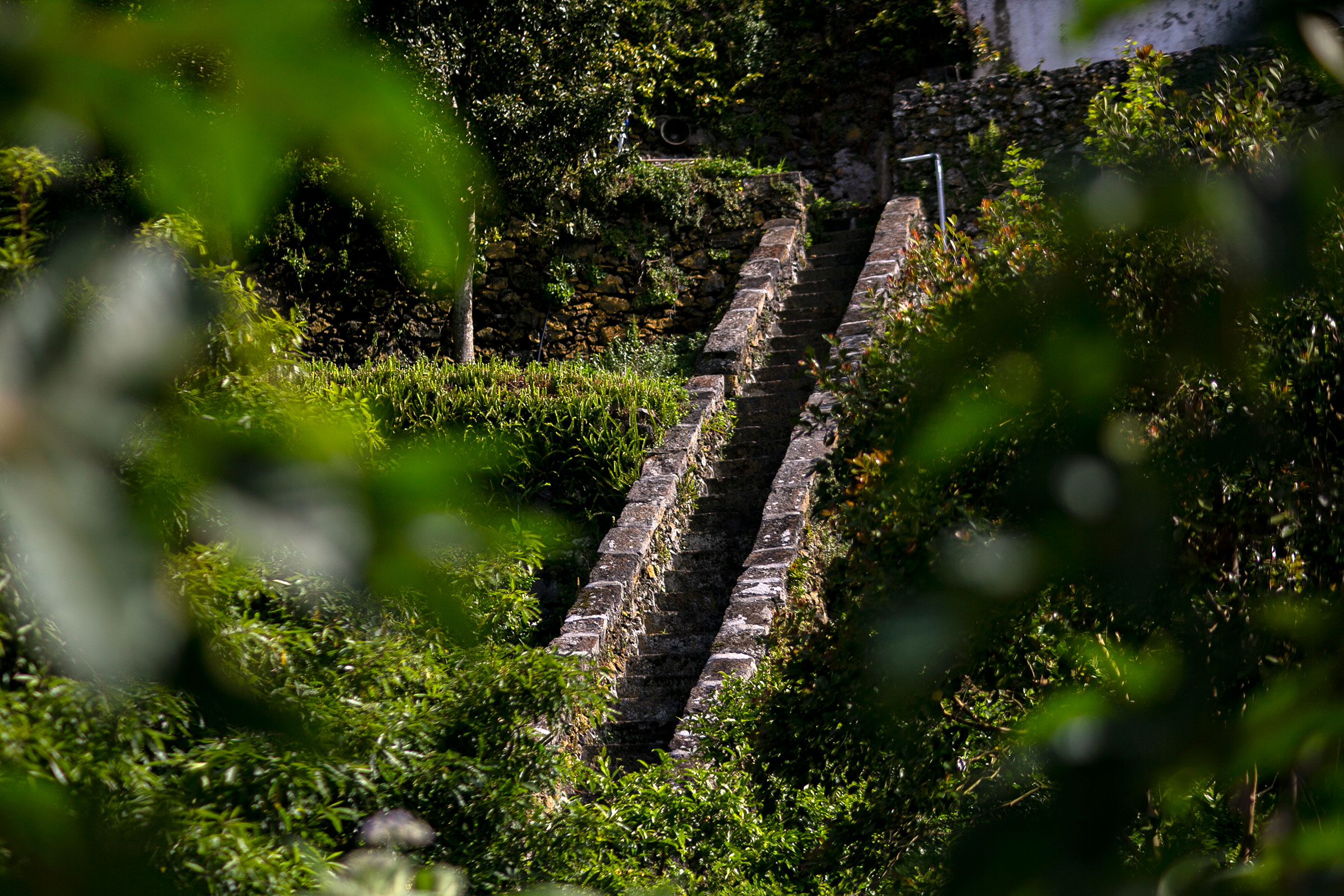
Work continues on the hill below the estate. Photo by Rui Soares
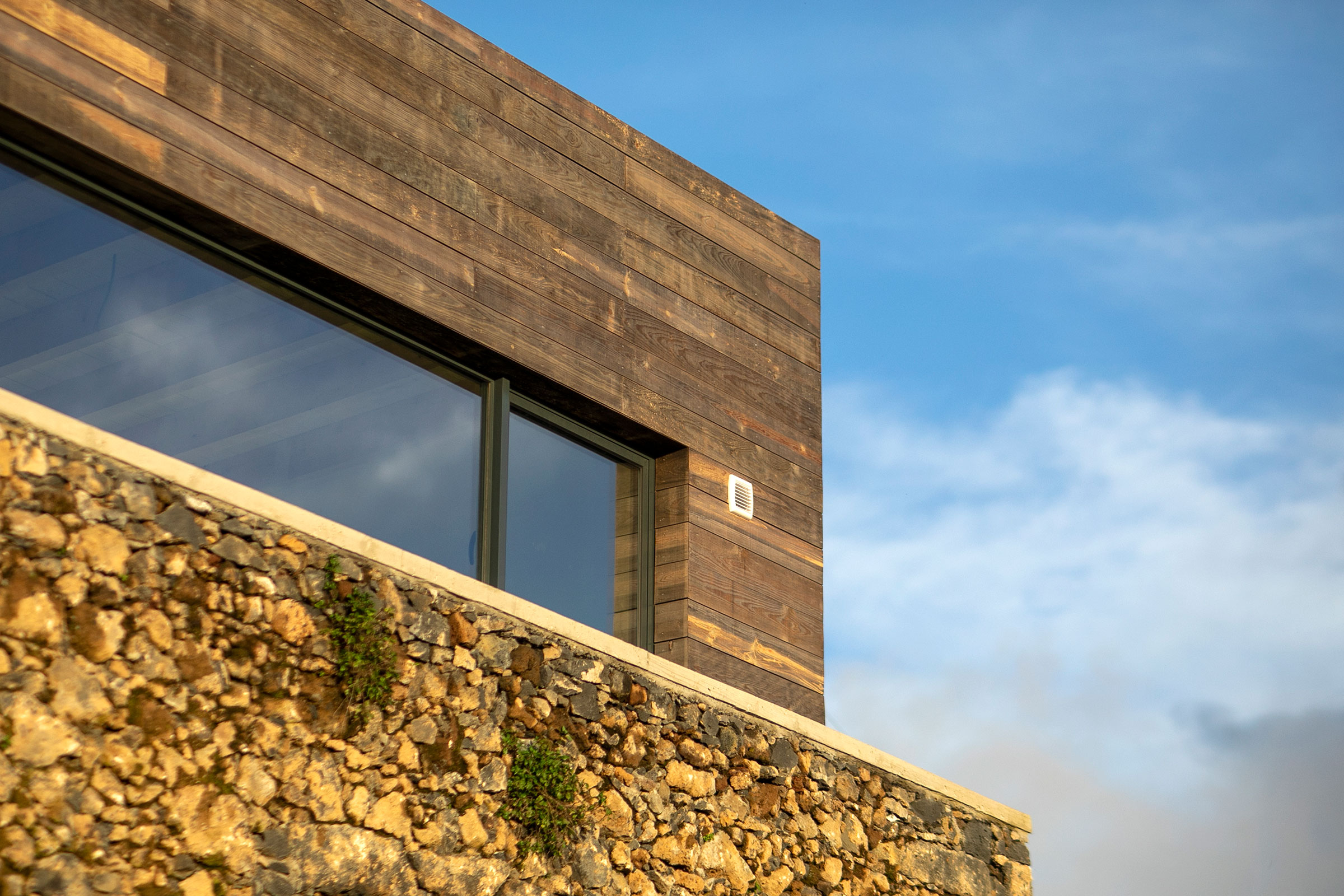
Photo by Rui Soares
Volcanic rocks found all over the property were used to repair crumbling walls, while banana trees, now thriving, started going in as soon as they bought the place. “We cleared the land and started to restore it immediately,” Bullock says.
Sustainable Programming
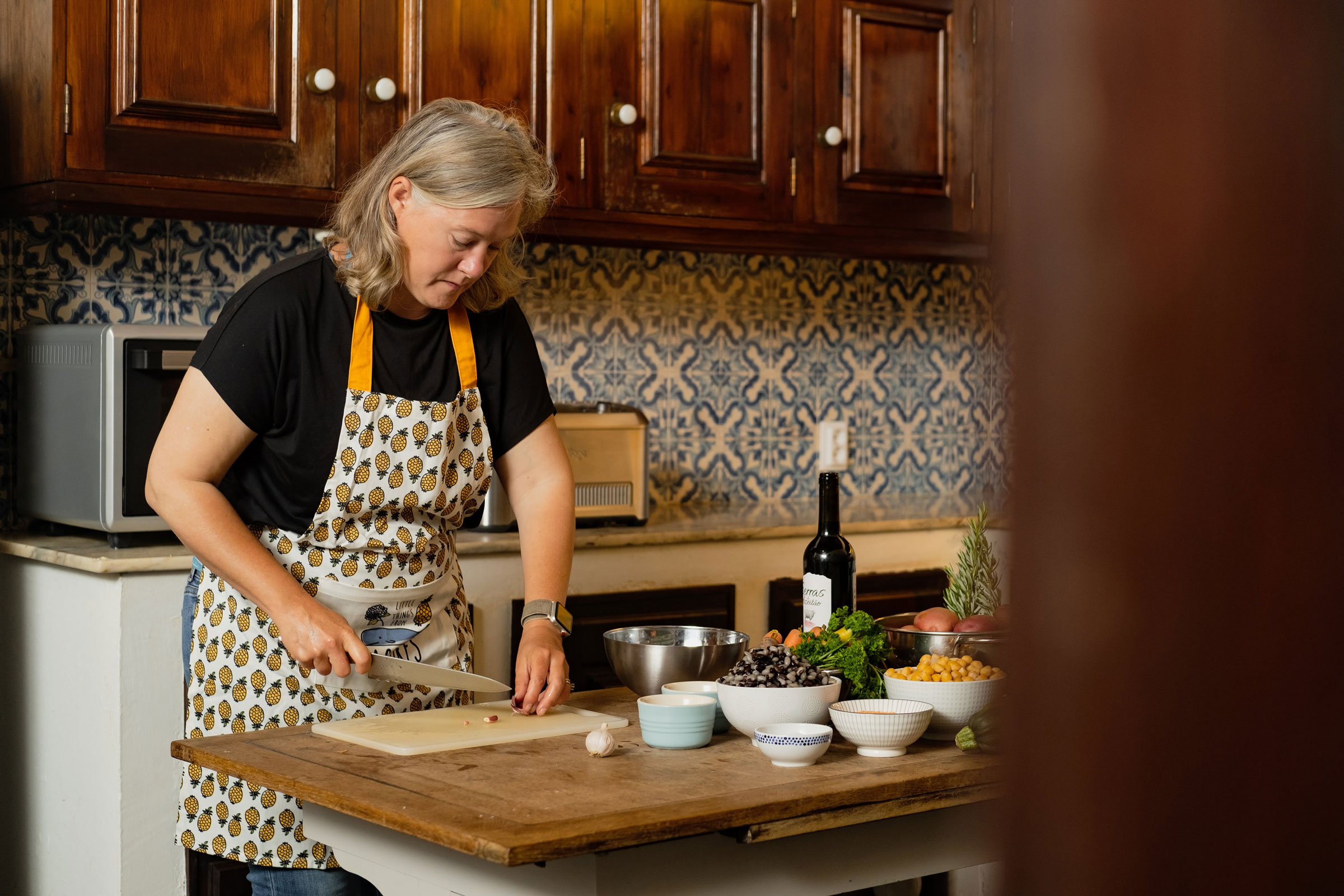
Co-owner Caroline Sprod prepares a special meal at the hotel. Photo by Rui Soares
Sprod and Bullock do things differently from much of the hospitality industry. They view hosting guests as a partnership—an opportunity to educate and work together to make the world a better place.
Solar Branco recently installed an innovative system for resource monitoring that gives hotel guests a report on the ecological impact of their stay. Called My Green Butler, the program measures individual guests’ resource usage. They can get real-time info about how much water and electricity they used, for example, and tips for how to reduce it. Feeling chilly? Grab an extra, cozy blanket from the closet. And so on. “It tries to partner with them rather than take away enjoyment,” Sprod says. “It’s meant to be a very engaging way to help people really take ownership of the resources they’re using.”
Solar Branco has a total ban on single-use plastic and pesticides and is the first in the Azores to commit to being a zero food waste hotel. They’ve been able to reduce the resources used in the food by relying on seasonal offerings grown on the farm or nearby. “We try to give people things they wouldn’t necessarily have day to day as well, rather than the same offer you might get anywhere,” Sprod says.
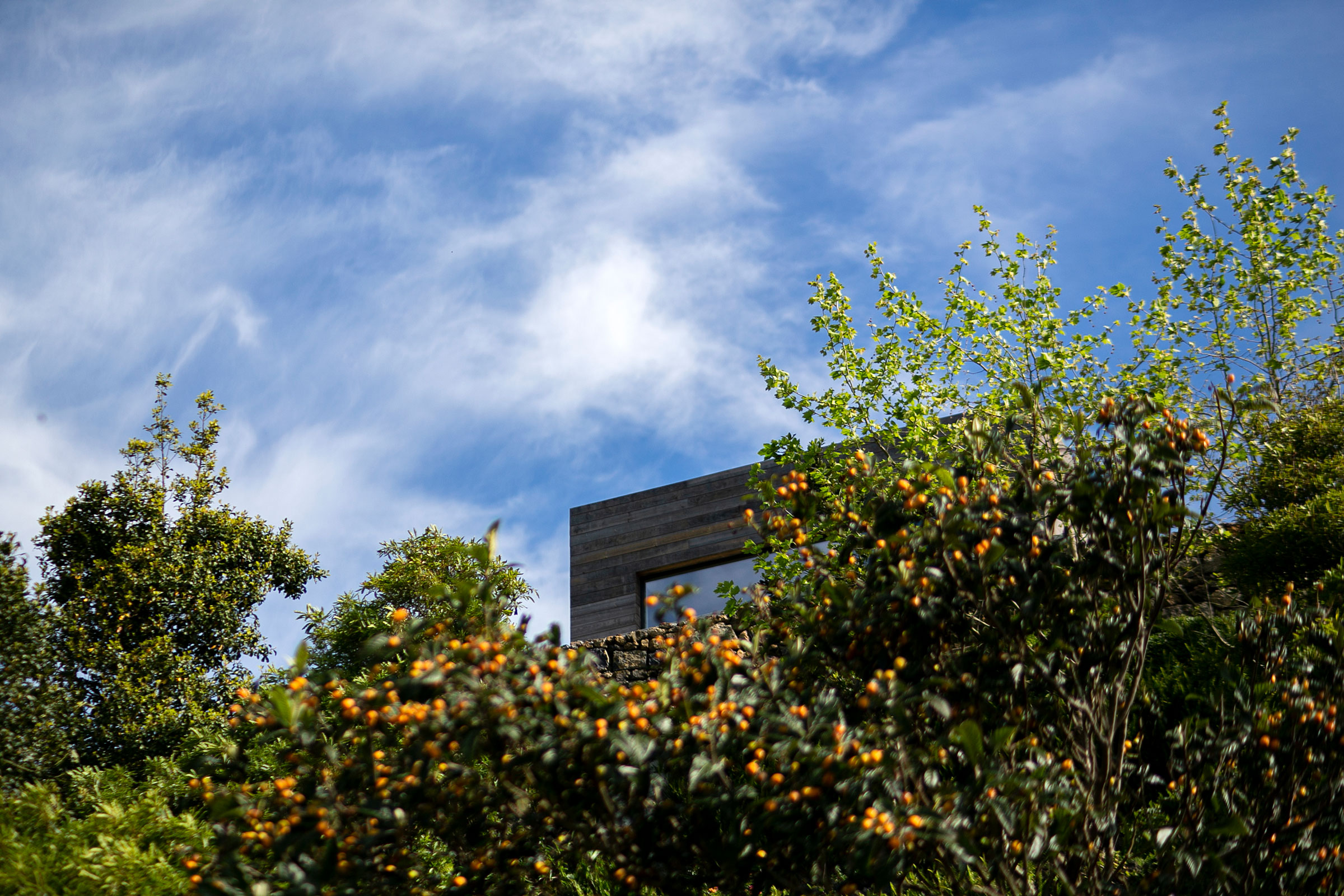
Local oranges from the property are on offer to guests at breakfast when in season. Photo by Rui Soares
You won’t find an overwhelming smorgasbord at Solar Branco, but you certainly won’t go hungry. Breakfast offers everything you need to start the day off right, say, before a long hike—and is quite literally farm to table. “A lot of businesses feel under pressure to offer this huge variety. We are really trying to not feel held hostage by that thought. We try to explain to people about what we’re serving, why we’re serving it, and how they can enjoy something really local,” Sprod says.
Guests can take their fruit (grown on the farm), pastel de nata (Portuguese custard tart), and locally sourced breads and jams with their coffee or tea and dine on the terrace overlooking the green hills and ocean beyond. “A lot of people say it’s so quiet and tranquil here,” Sprod says. “We look out onto farmland. Right now I can see a couple of cows. It’s quite a nice vista.”
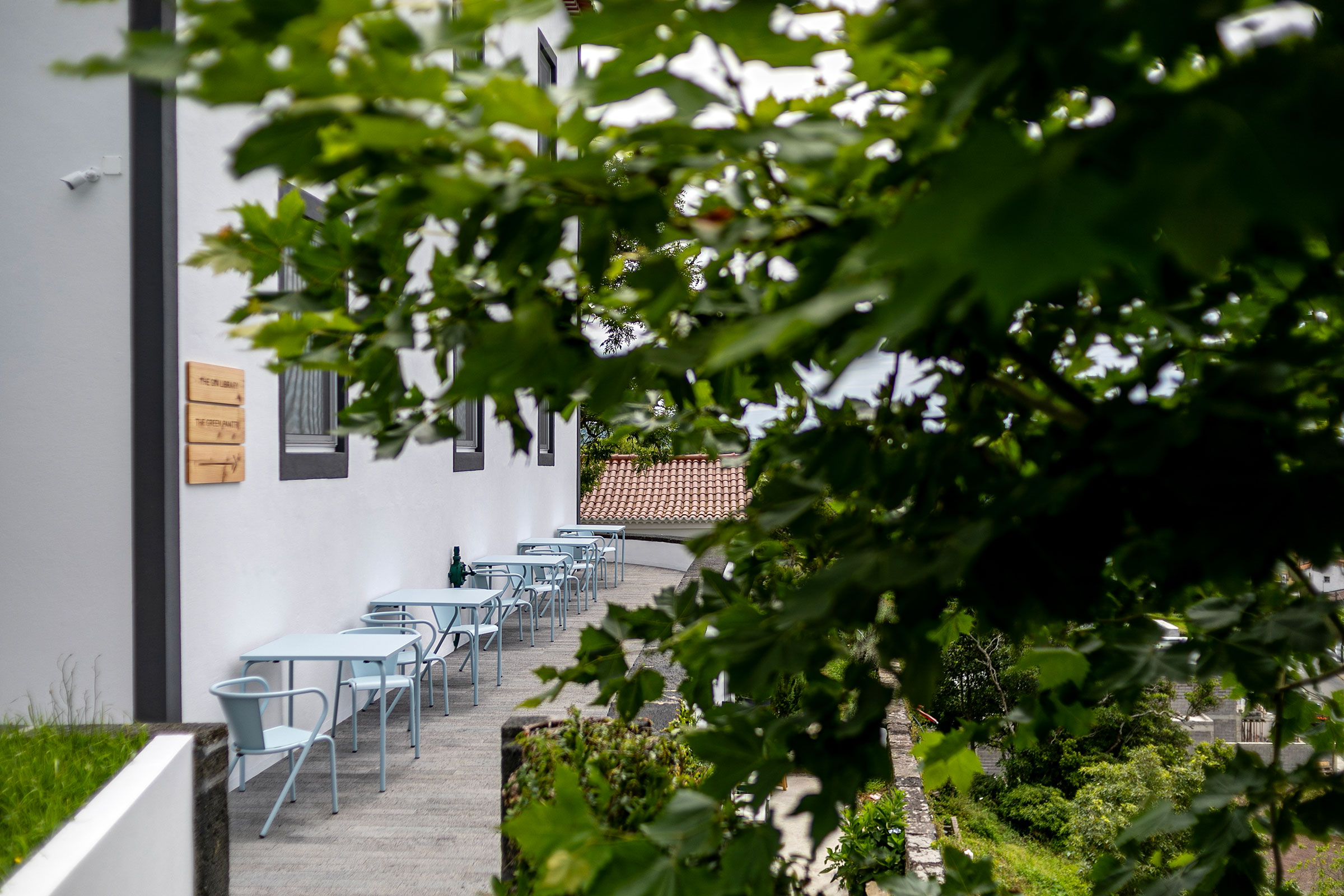
Guests can dine on the terrace overlooking the beautiful grounds and farmland beyond. Photo by Rui Soares
In the evenings guests can reserve a spot in the chef-led sushi experience in the hotel’s invitation-only speakeasy behind the Gin Library (formerly stables, now home to more than 1,000 bottles of gin from all over the world) after a complimentary gin and tonic happy hour. Chef Joanna blends typical Azorean flavors with local, sustainable fish in an omakase-style dinner.
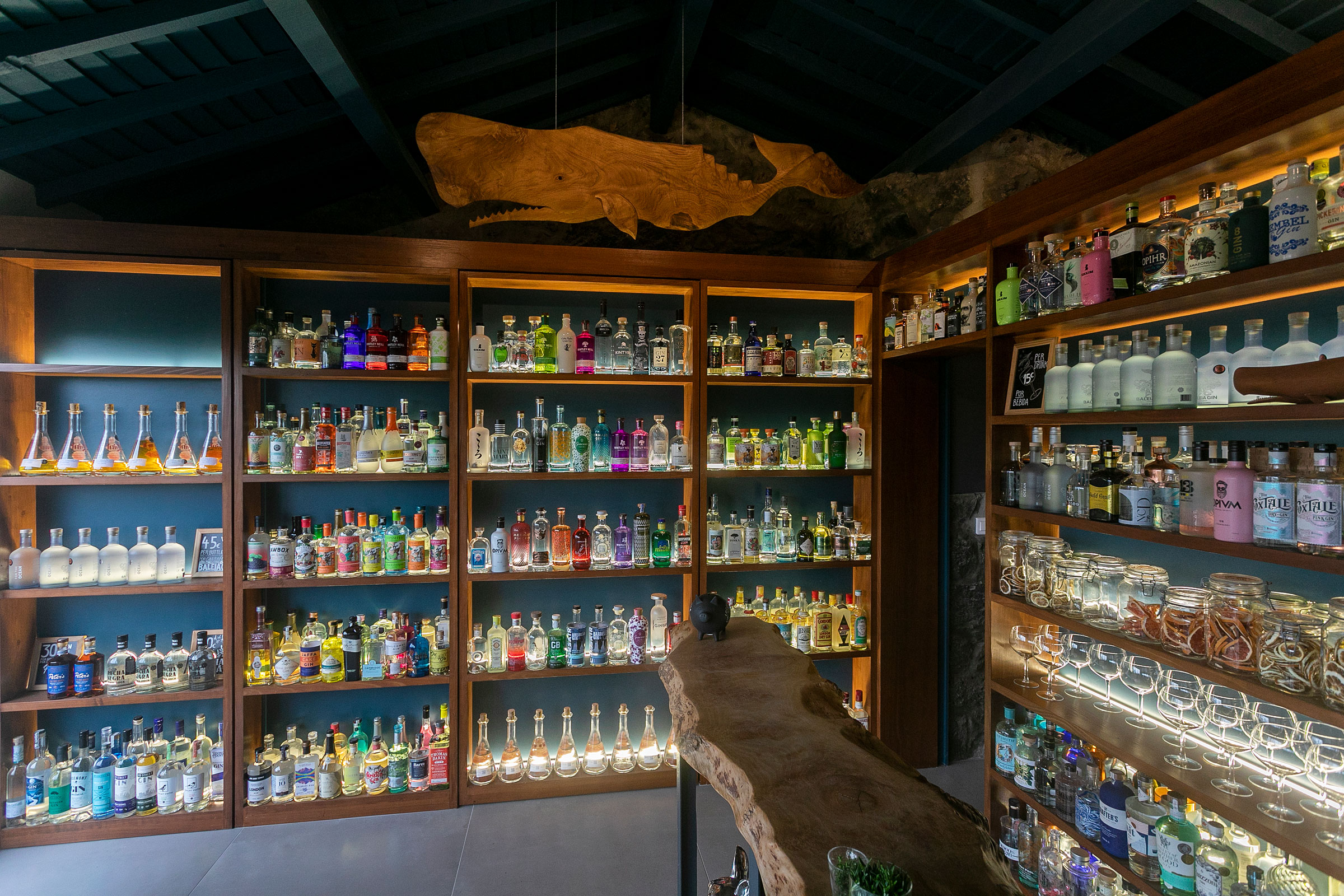
Solar Branco is home to Europe’s largest gin collection and serves hundreds of gin and tonics a month. As such, they’re committed to ensuring 100% of their glass is recycled once those bottles are empty. Photo by Rui Soares
Locally Sourced Interior Design
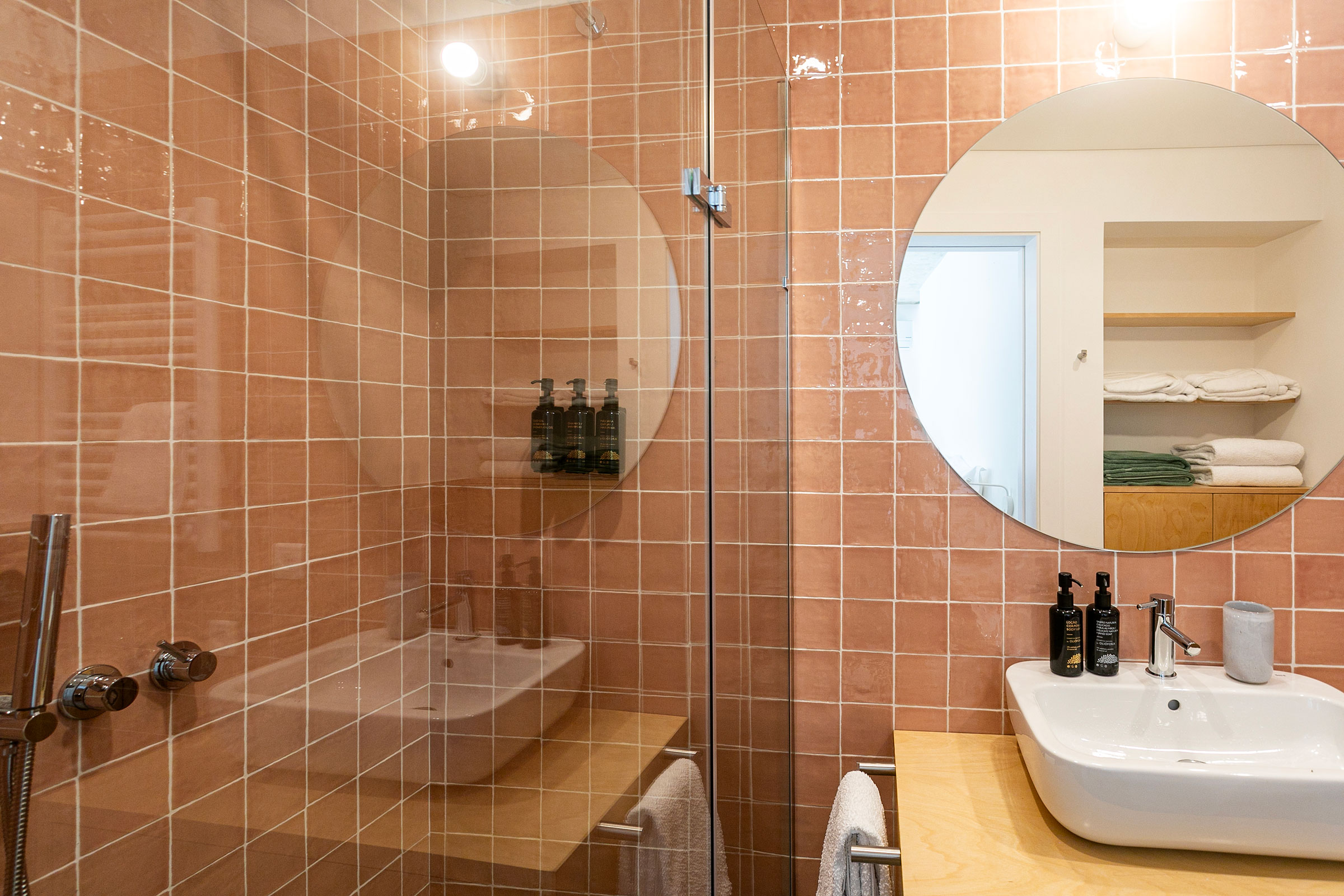
Accommodations at Solar Branco Eco Estate are clean, minimalist, and organic, including handmade soaps from a Portuguese artisan. Photo by Rui Soares
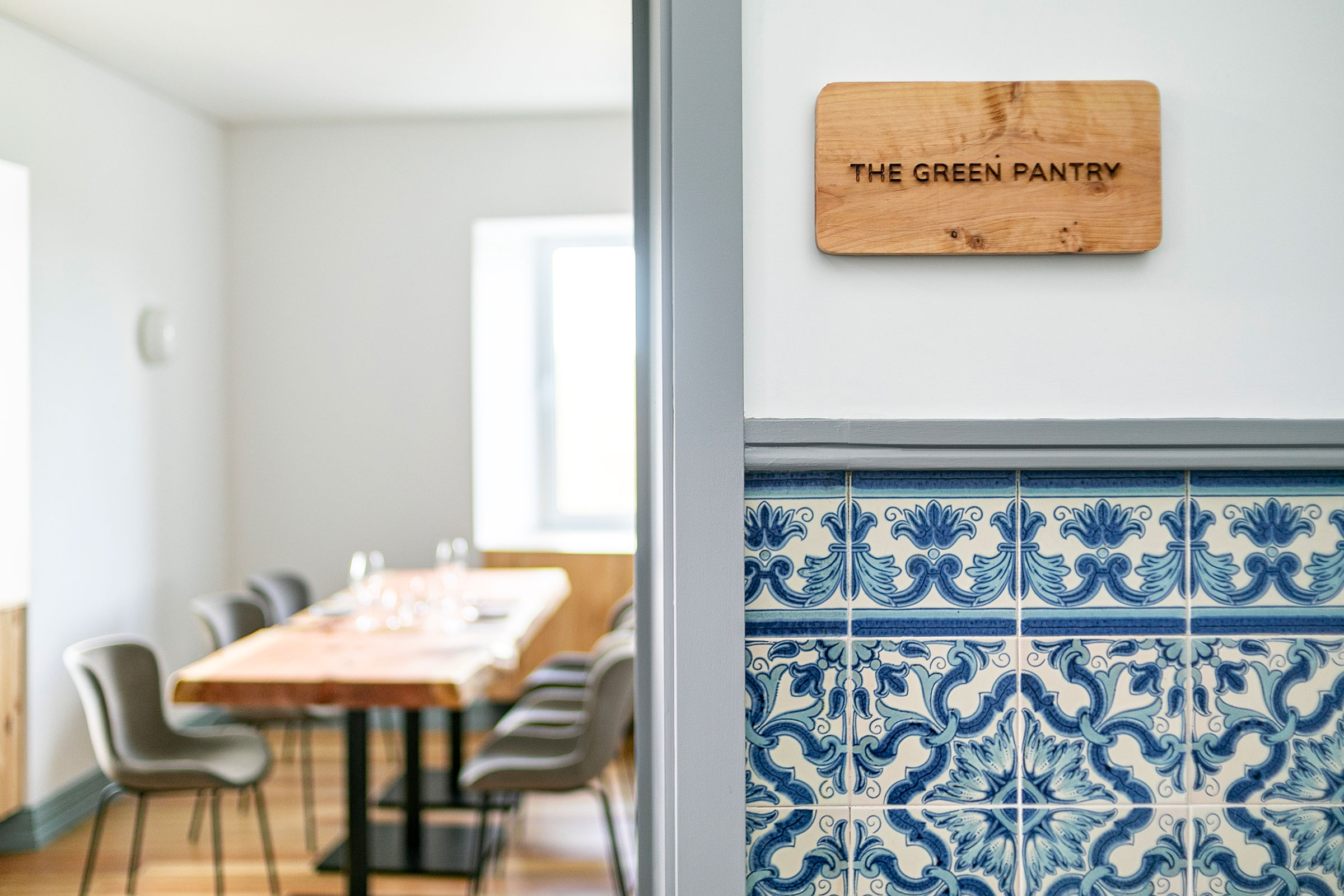
“Bom Dia” breakfast is included in each guest’s stay, with locally sourced ingredients and bananas and oranges from the property. Photo by Rui Soares
Throughout the estate interior design incorporates small artisans from Portugal and the Azores wherever possible. “There aren’t that many people producing things locally, but for example the beds are made in a workshop in Portugal with natural materials. They’re really good for the body to breathe at night,” Sprod says. “We got the bedding from a factory in Portugal that uses really nice natural materials, too. It’s soft and gives people a comfortable night’s sleep. It can help cut down on the resources people use if they have a bed that keeps them cool.”
Tables throughout the spaces are made using wood from trees that fell on the island. “There’s a carpenter who lovingly looks at this wood and dries it out for years until it’s ready to be made into furniture. He made us tables for our dining room and all the different rooms,” Sprod says.
Dishes come from a small manufacturer in Portugal who uses recycled glaze—a process Sprod says is quite innovative for its waste reduction in manufacturing. Organic toiletries are made by a small Portuguese producer, including essential oils made from local plants. “We try to be really thoughtful about all of these things. I love things that are stylish but also unfussy, minimalist, and fit in with the sustainability focus we have.”
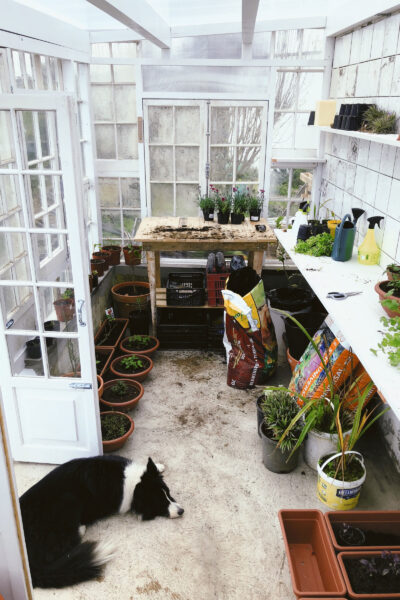
A greenhouse was built using windows and materials from the original buildings. Photo by Rui Soares
What they couldn’t use, like old shelving, they gave to neighbors during the renovation. “This is not a super rich community,” Sprod says. “There are people who really appreciate having building materials they can reuse.”
Windows that came out of the original buildings were moved to the back garden area and used to make greenhouses—now full of plants. “Typically in the construction industry here, the easiest thing is to scoop these things up in the back of the lorry and dump them in a landfill rather than make the effort to move them,” Sprod says. “We try to minimize any waste, and we wanted to be thoughtful about how we were treating the building and the contents in it.”
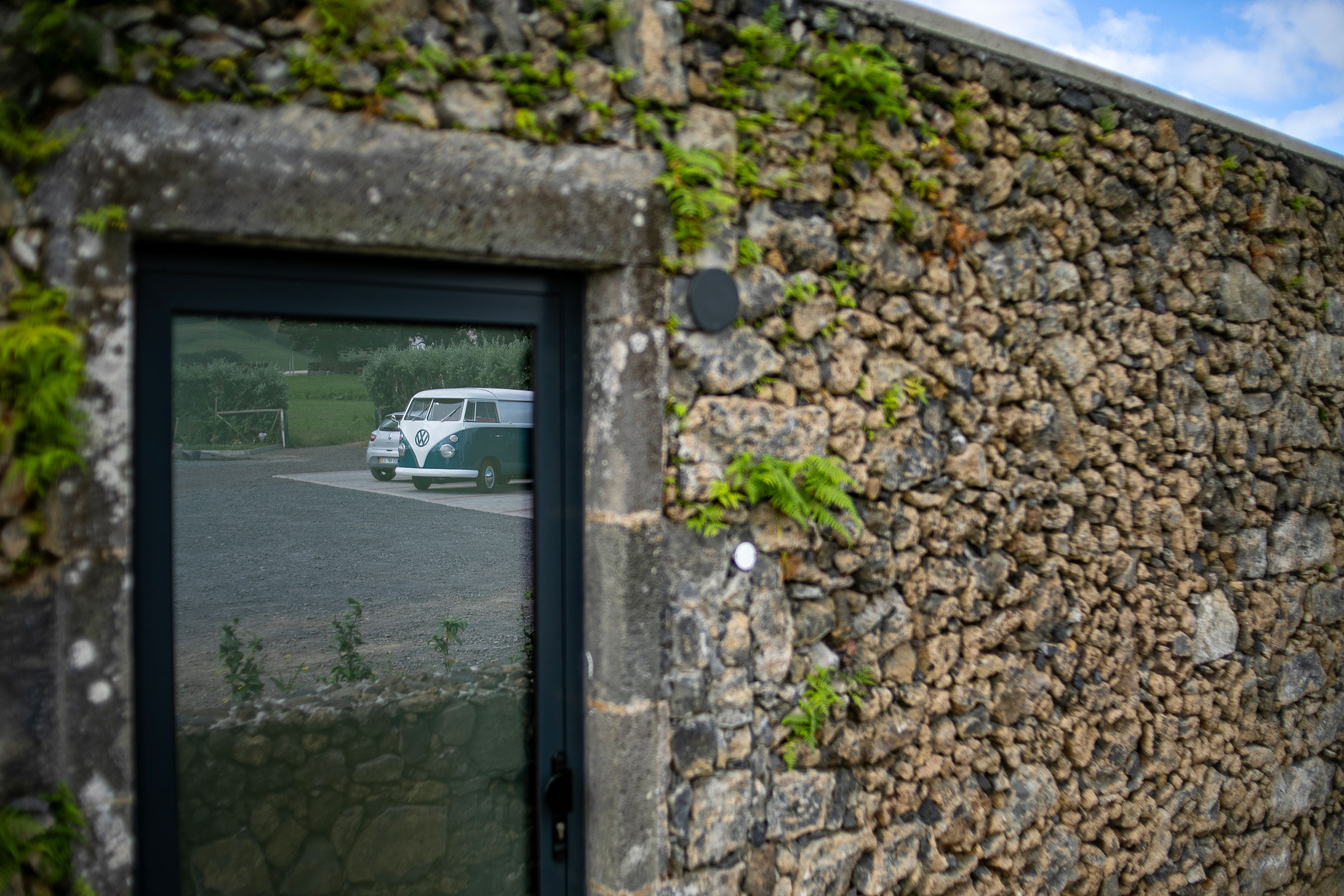
Crumbling rock walls were at every turn when the couple first bought the property that became Solar Branco. In the distance sits another of Ali’s projects—a vintage VW van being repurposed for special events. Photo by Rui Soares
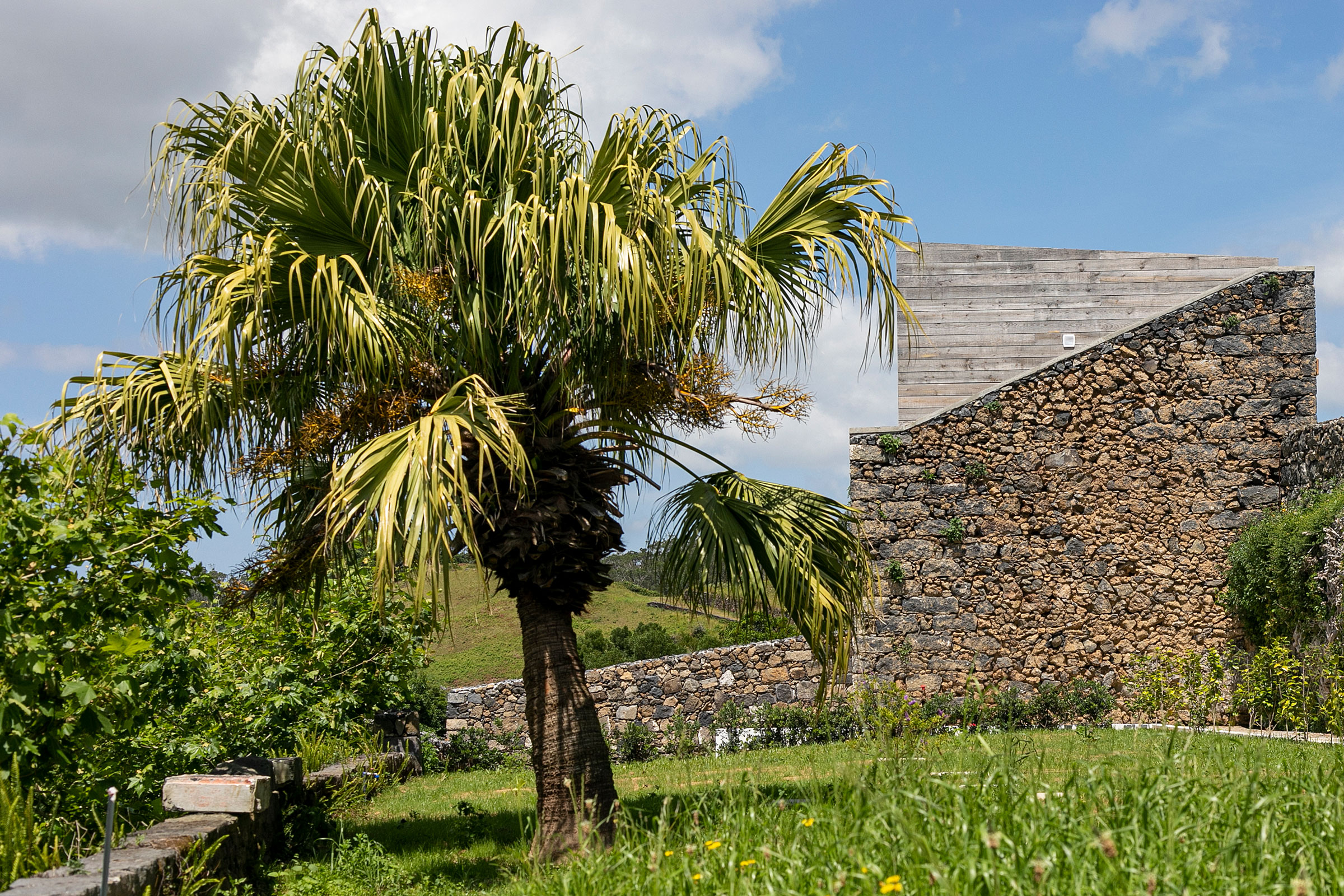
A side view of The Ruin at the Solar Branco Eco Estate. Photo by Rui Soares
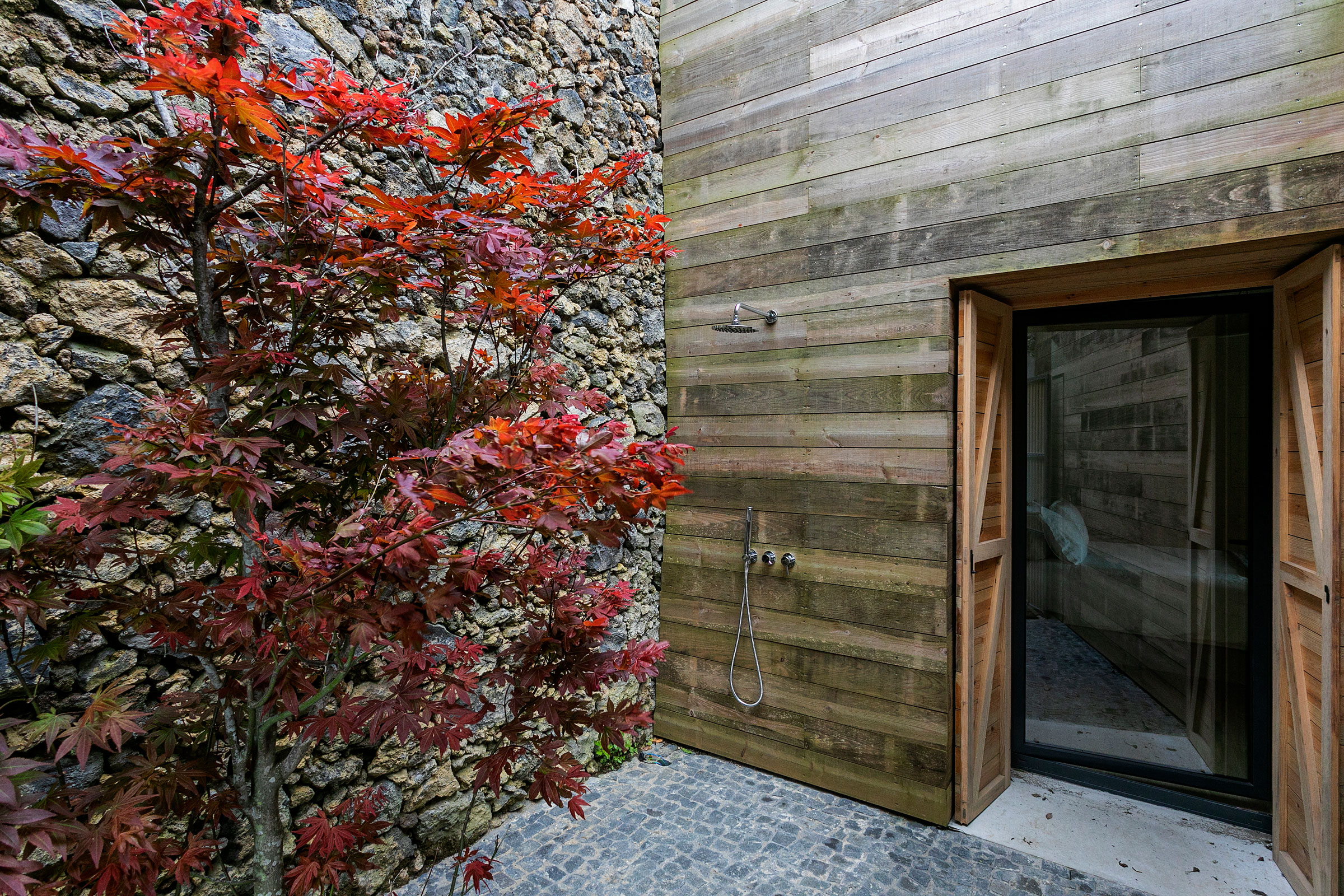
There are a diverse mix of accommodations to choose from at the Solar Branco Eco Estate. Photo by Rui Soares
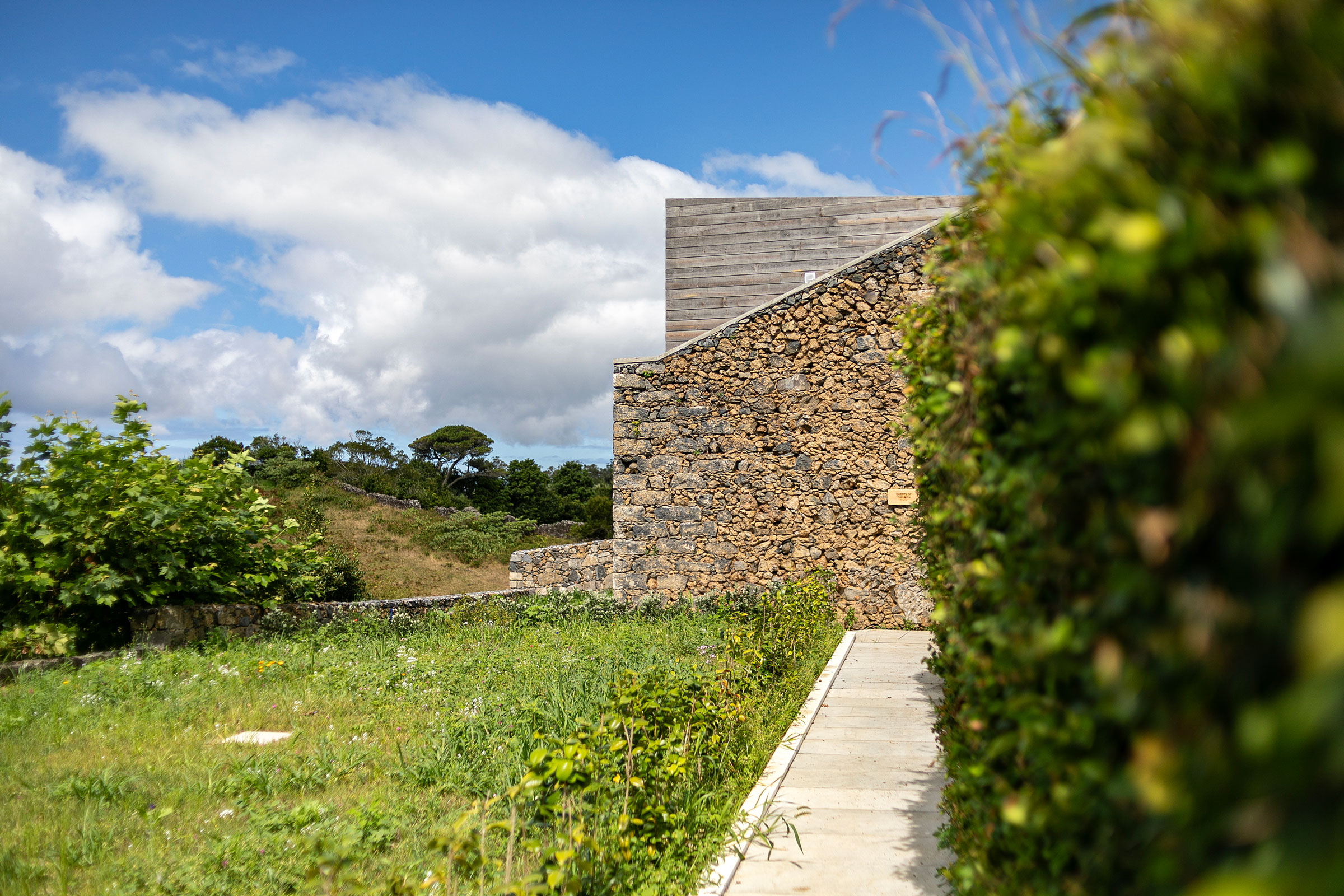
Solar Branco Eco Estate. Photo by Rui Soares

